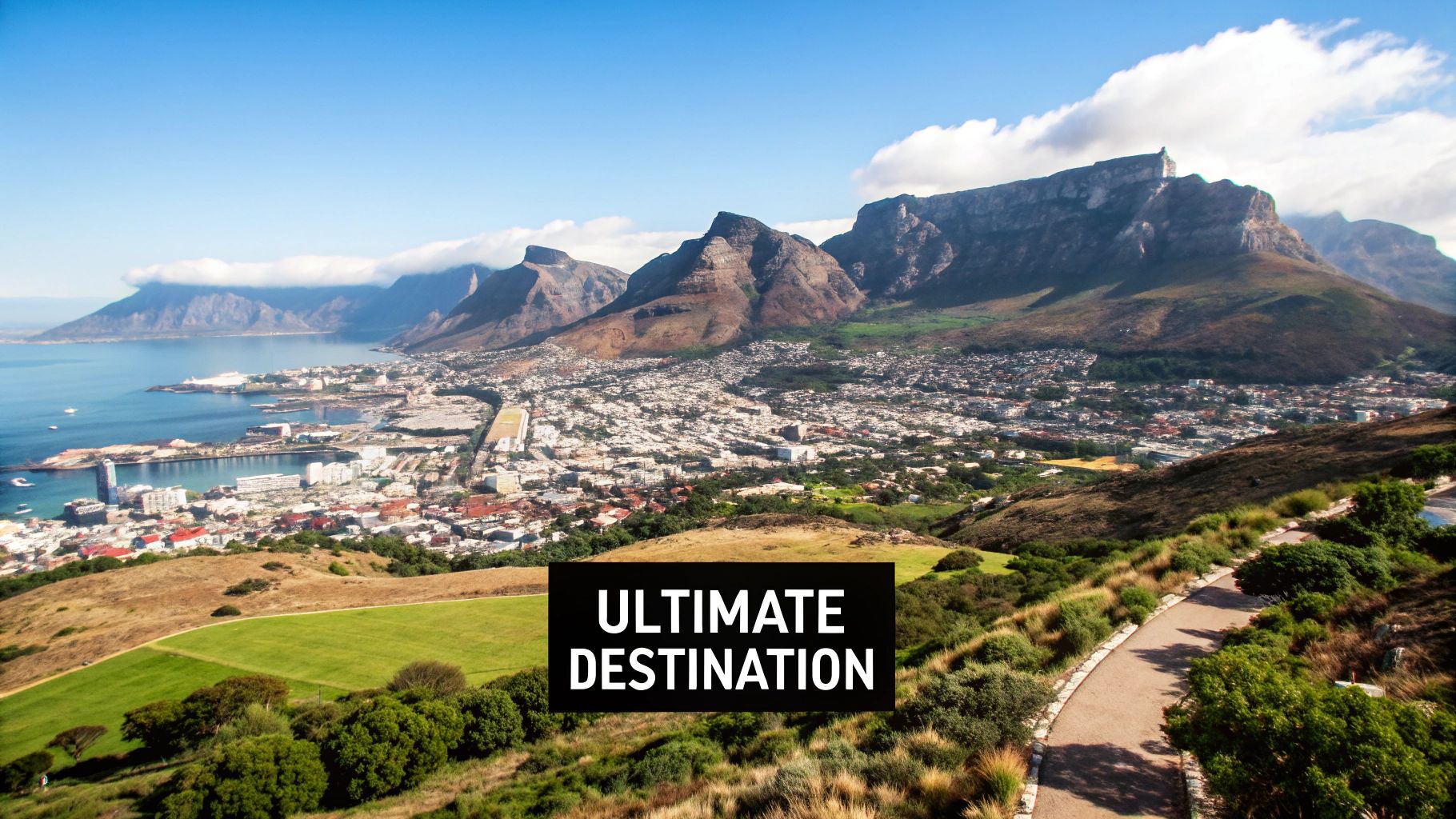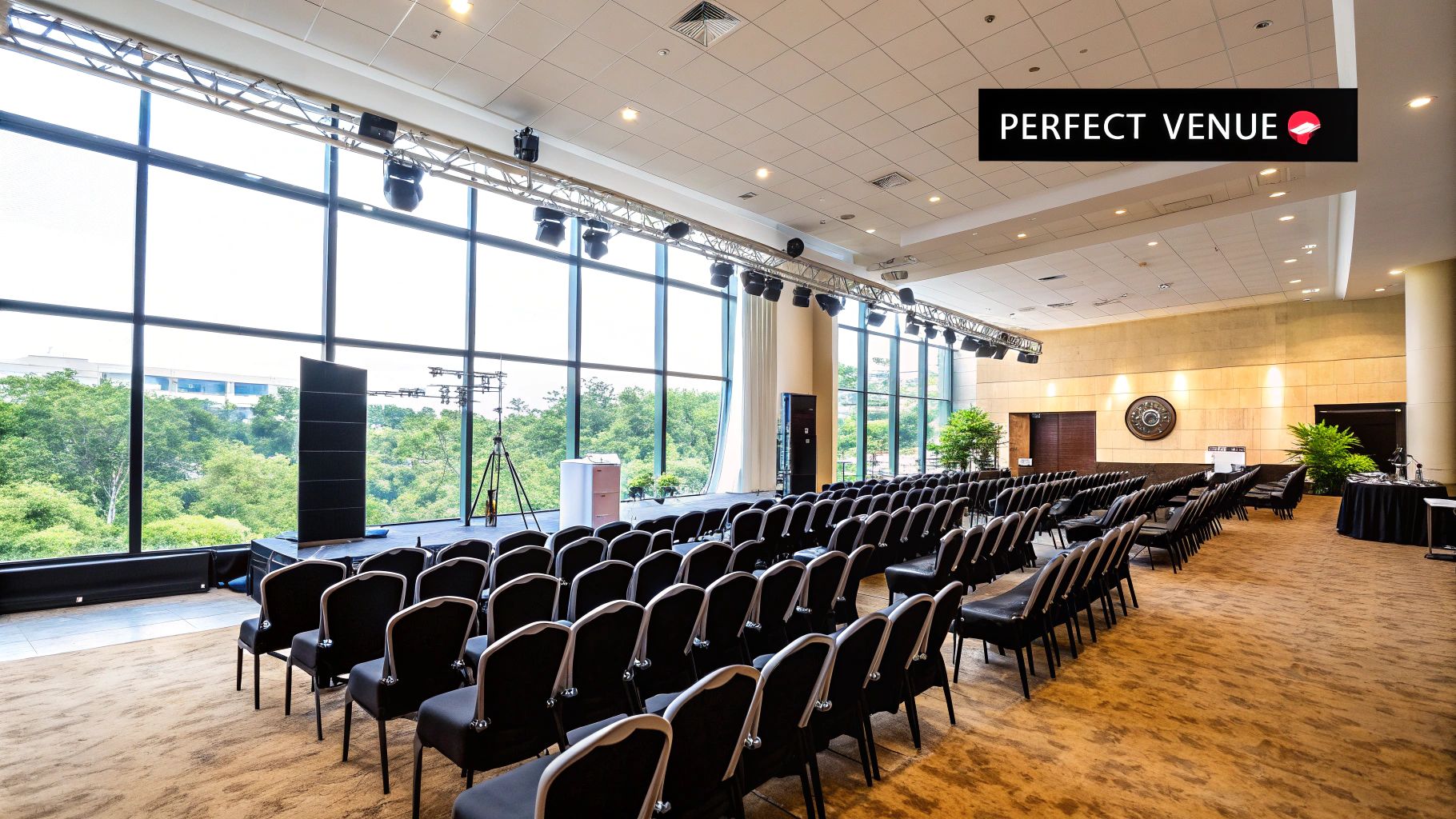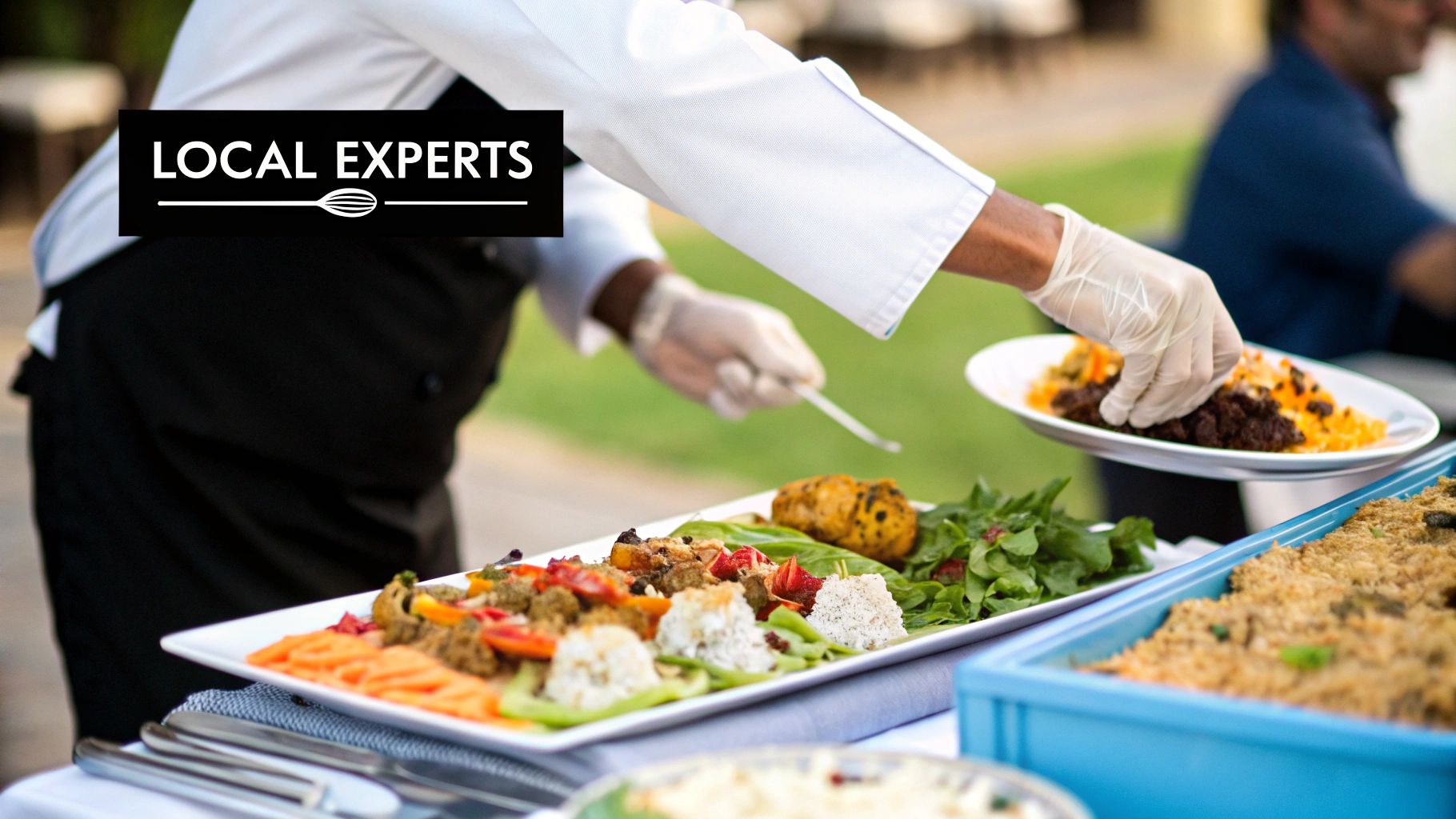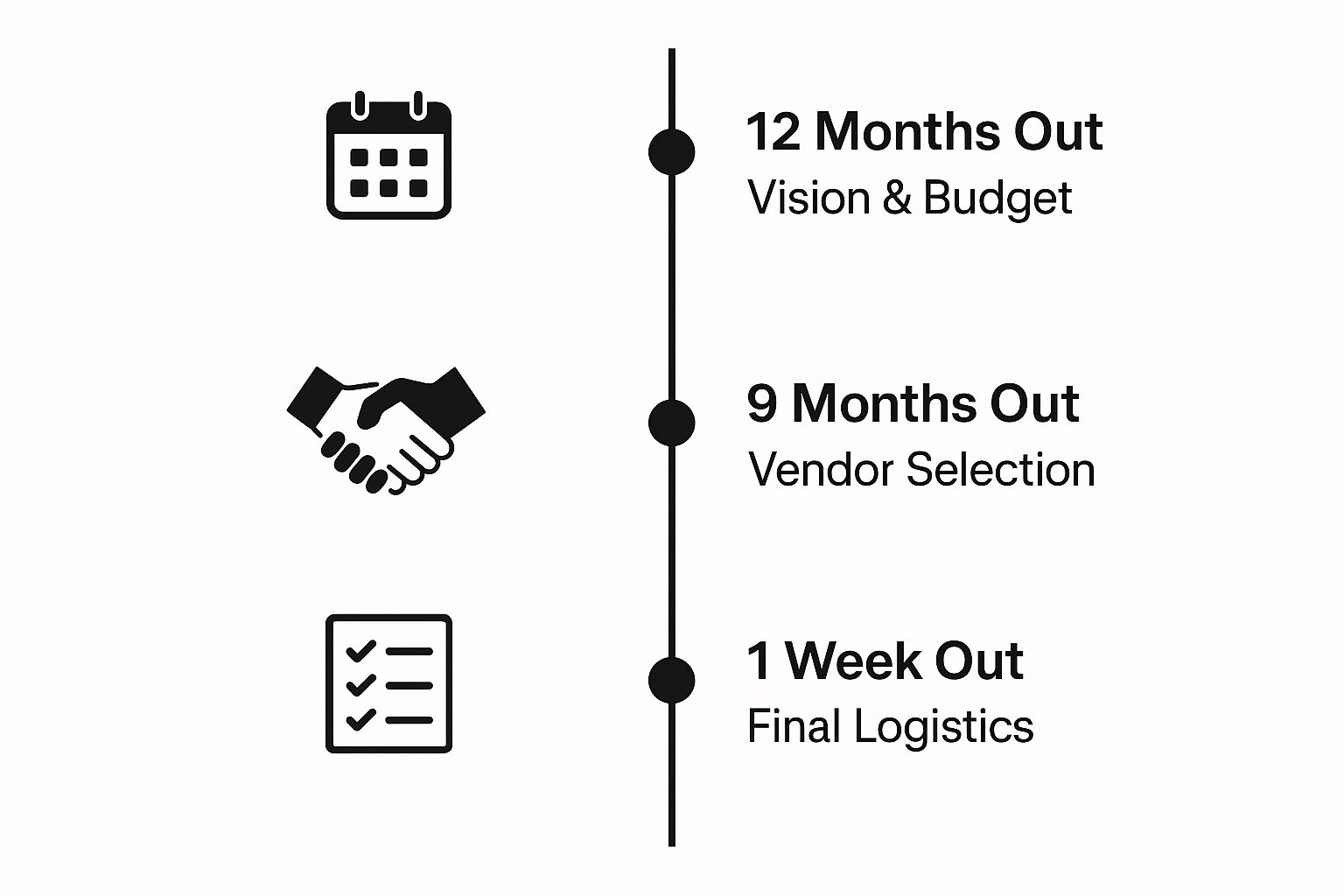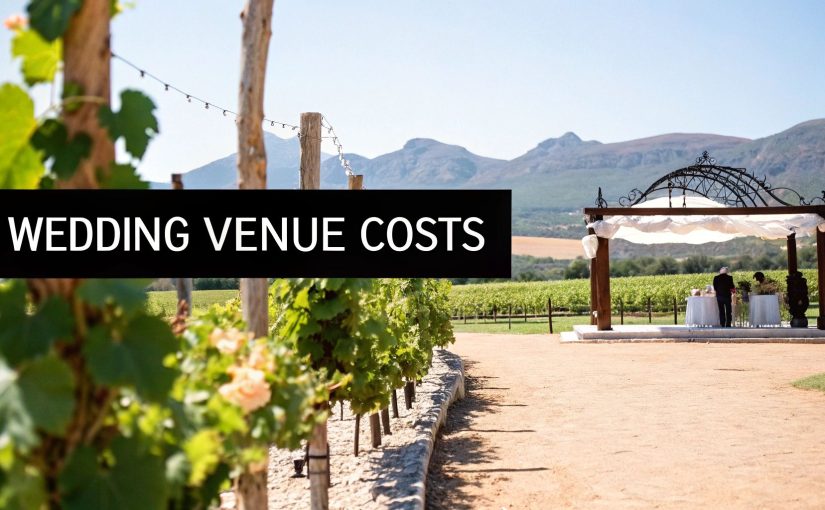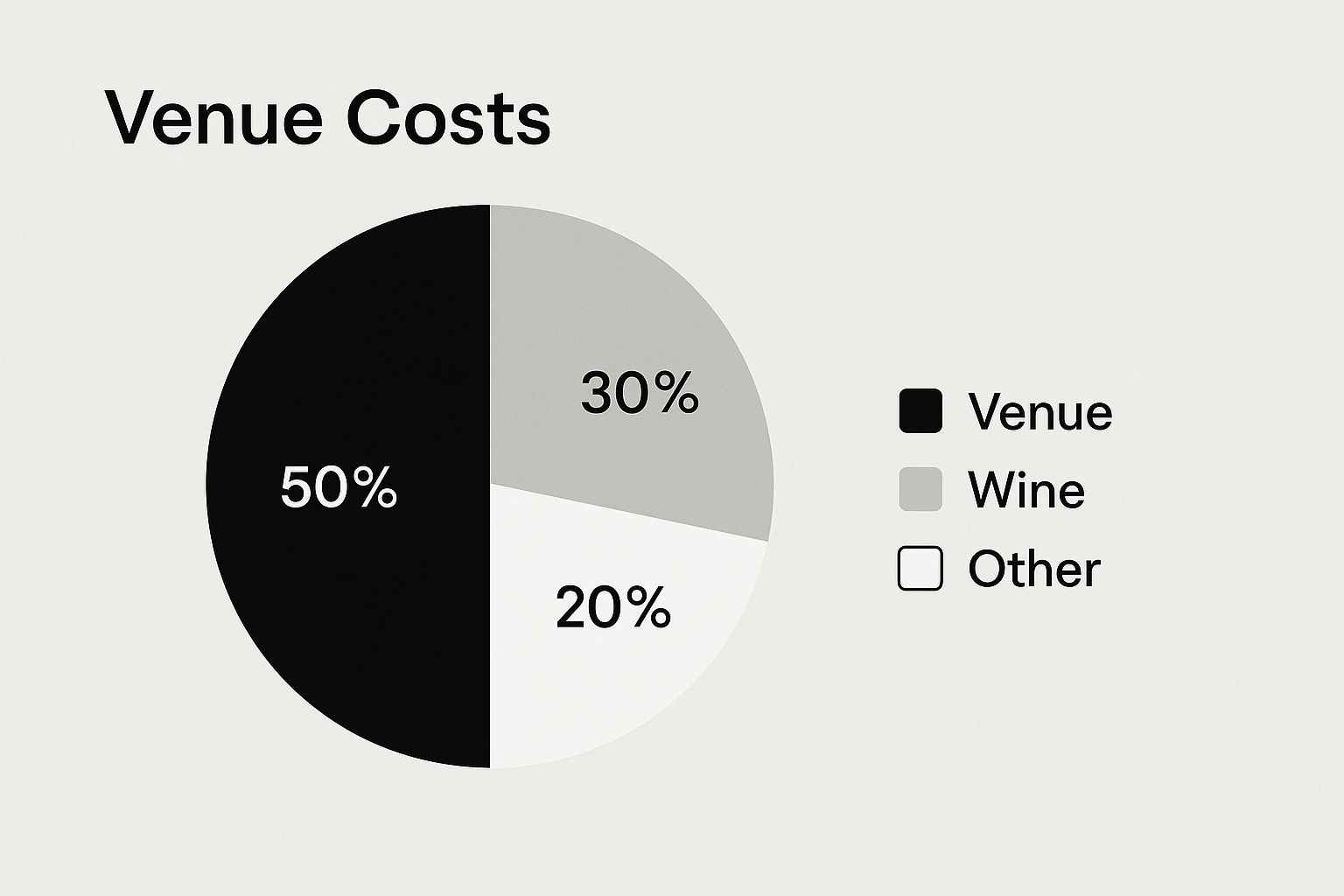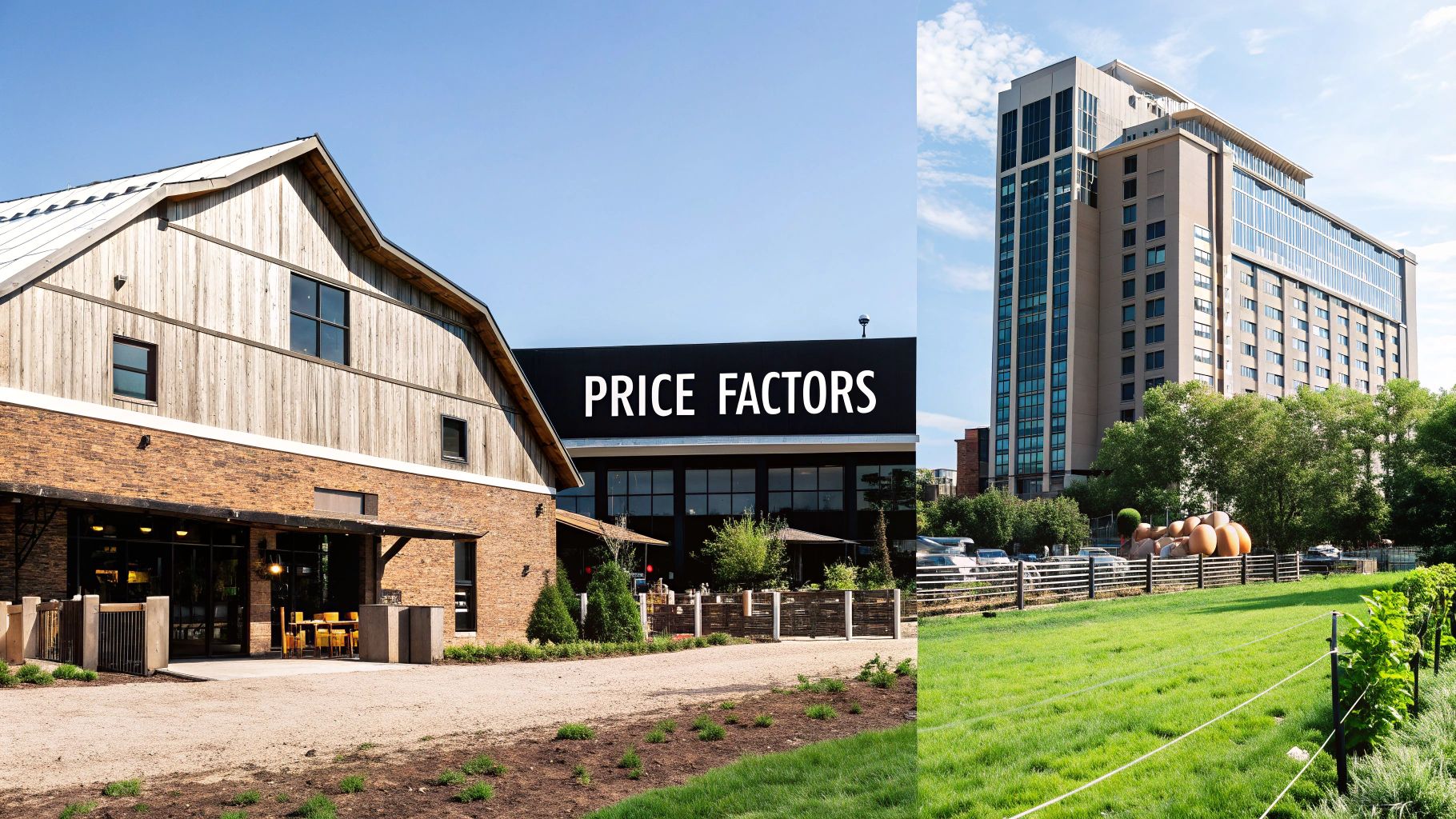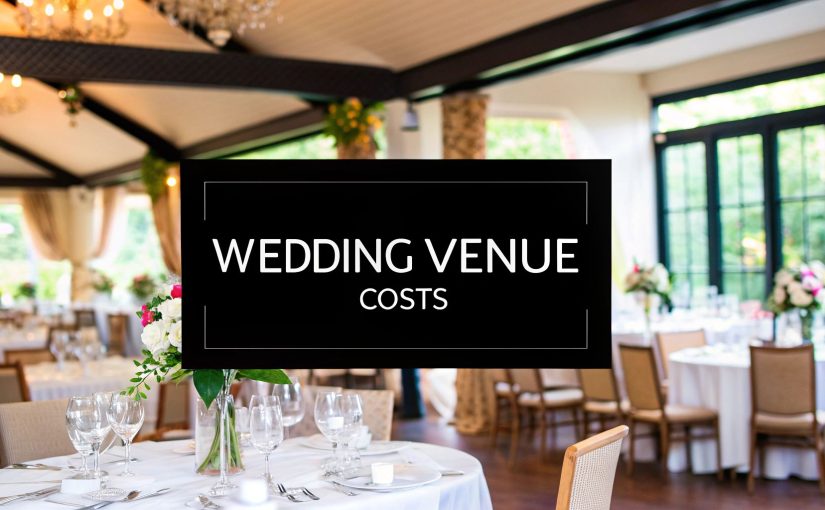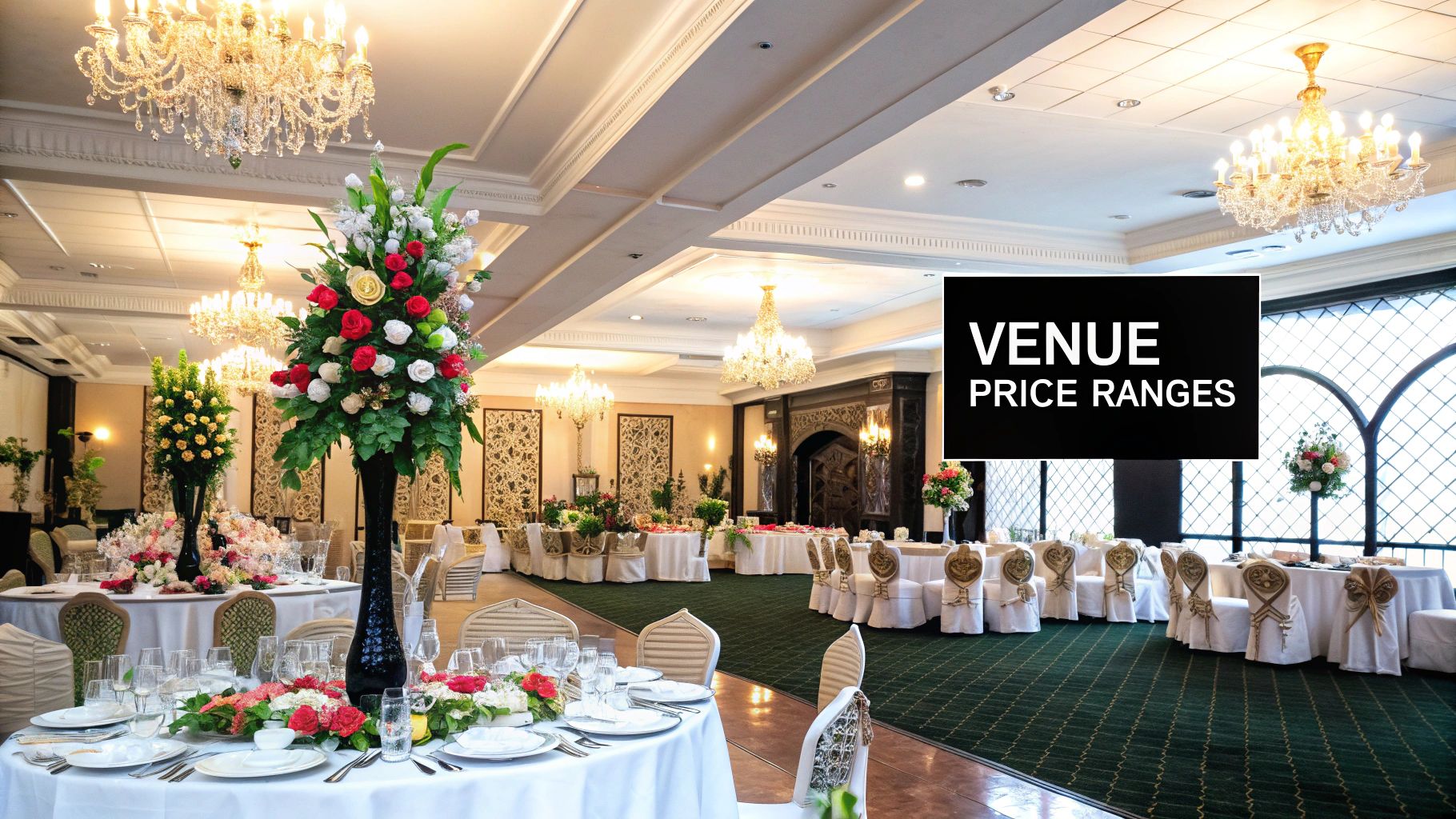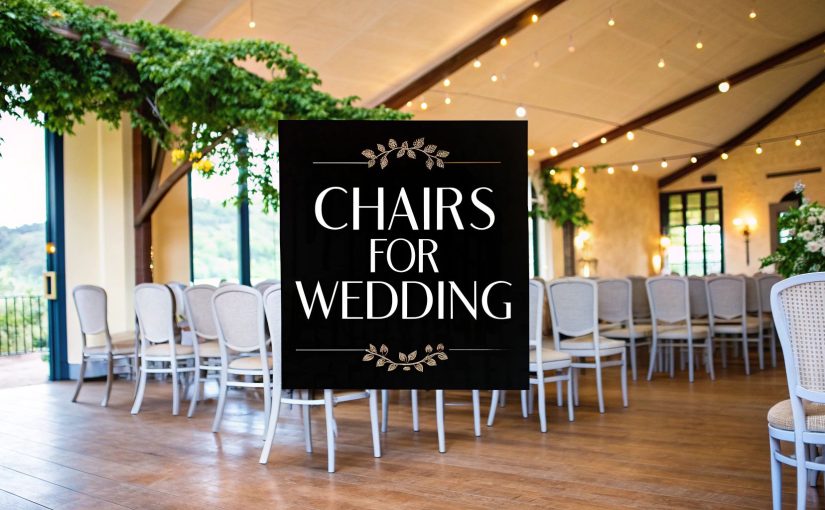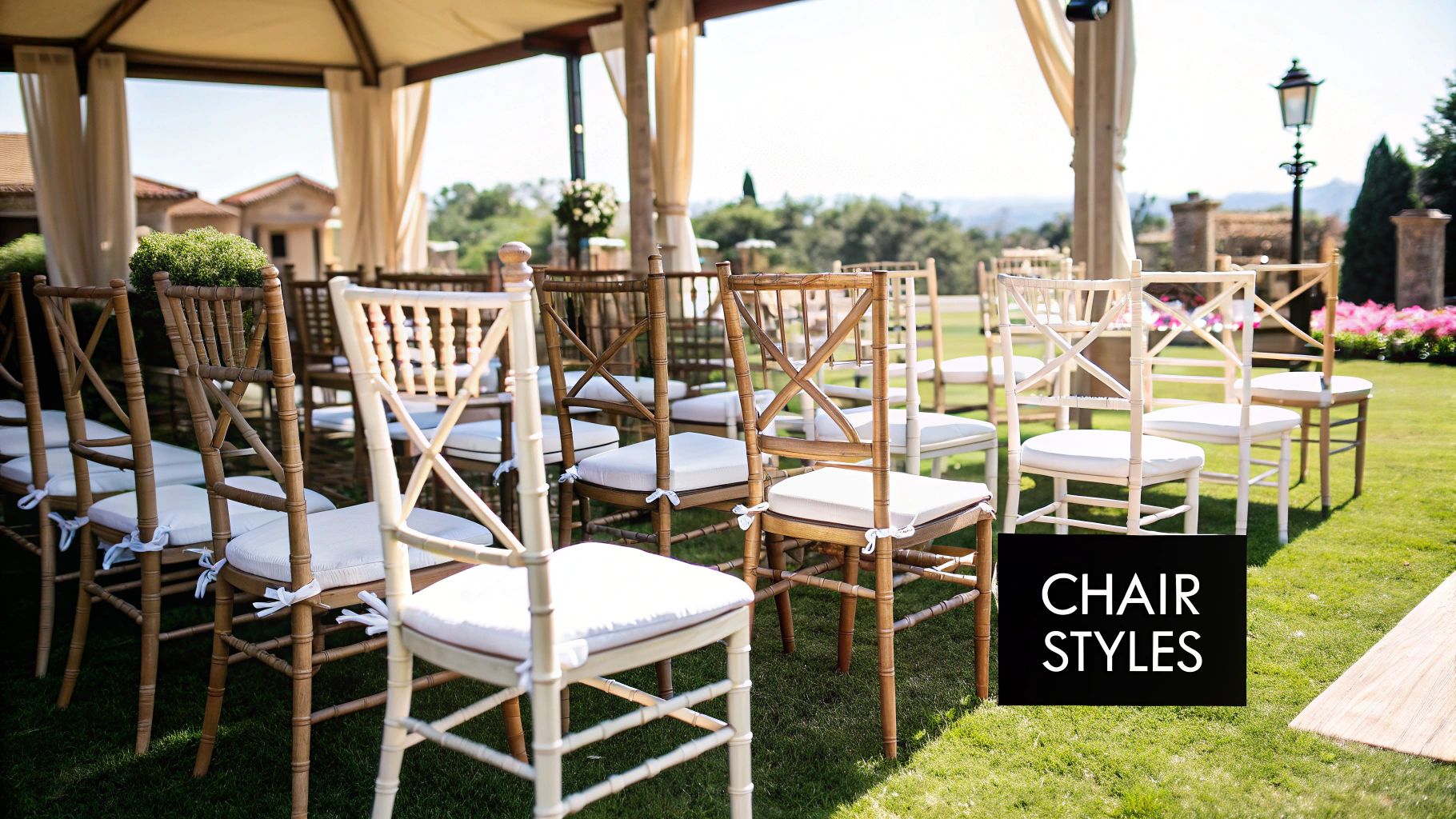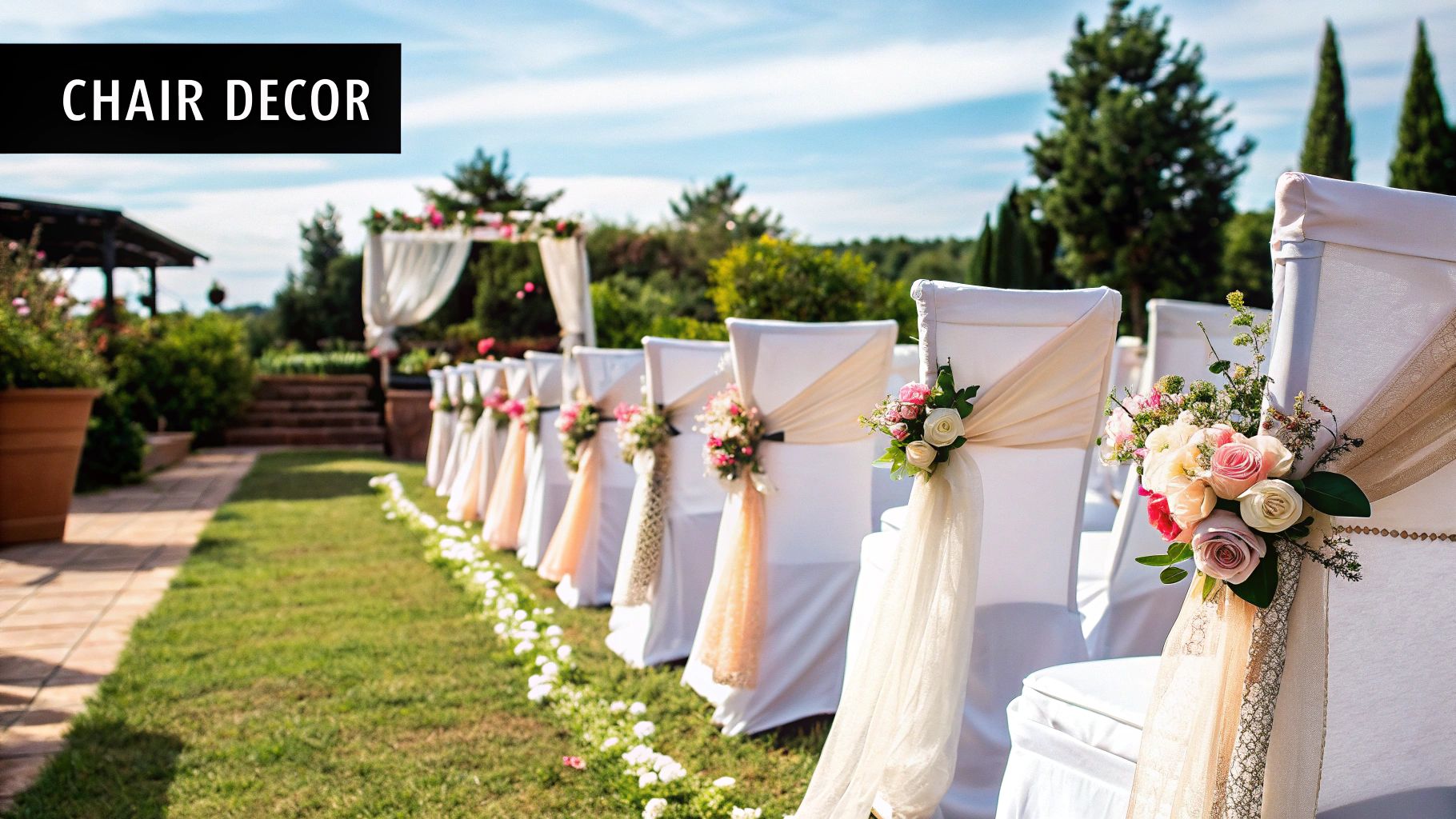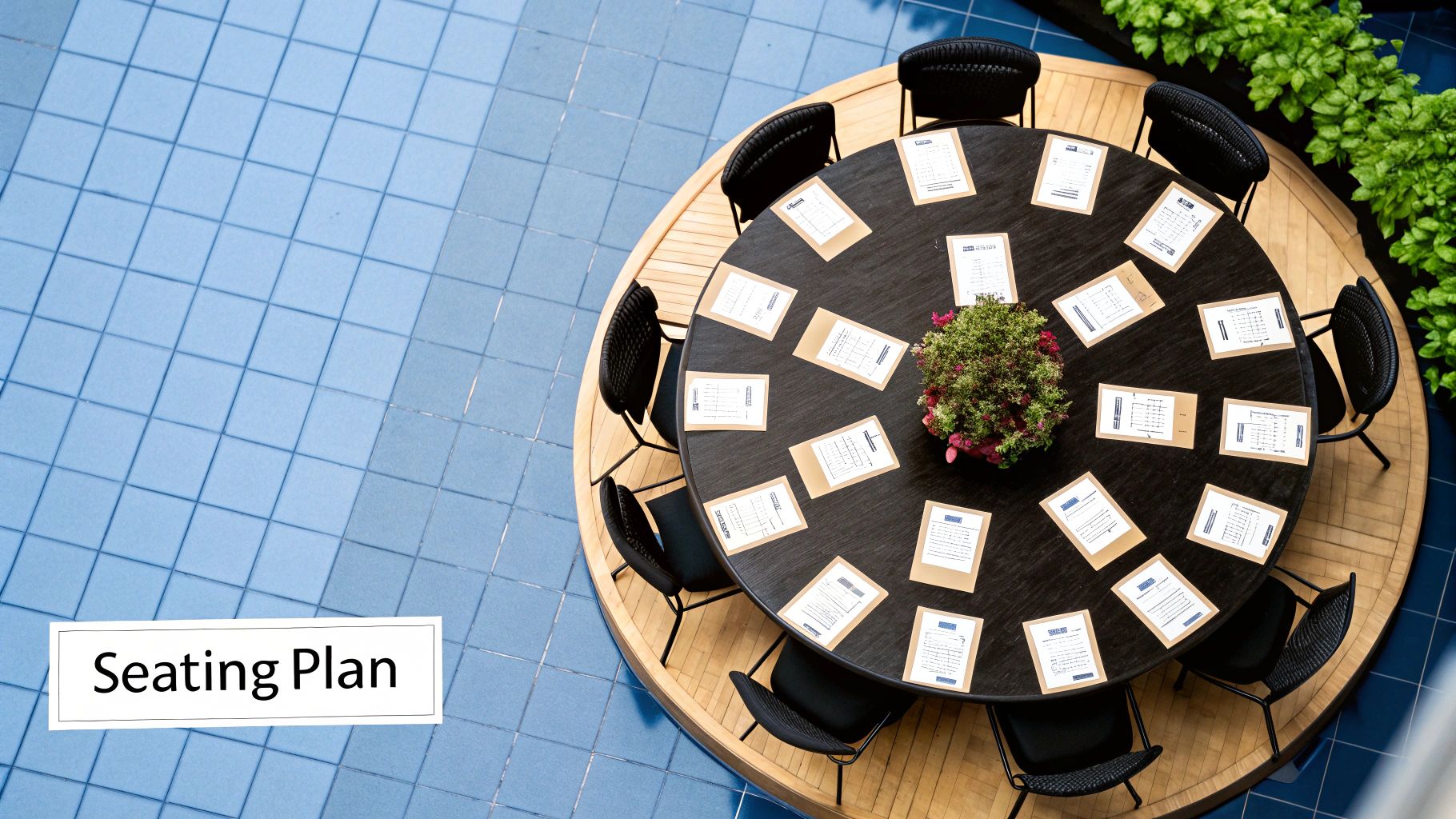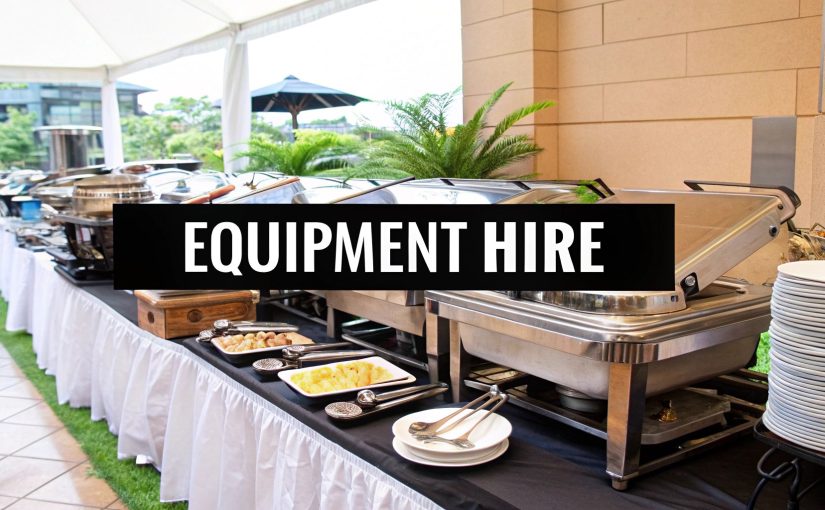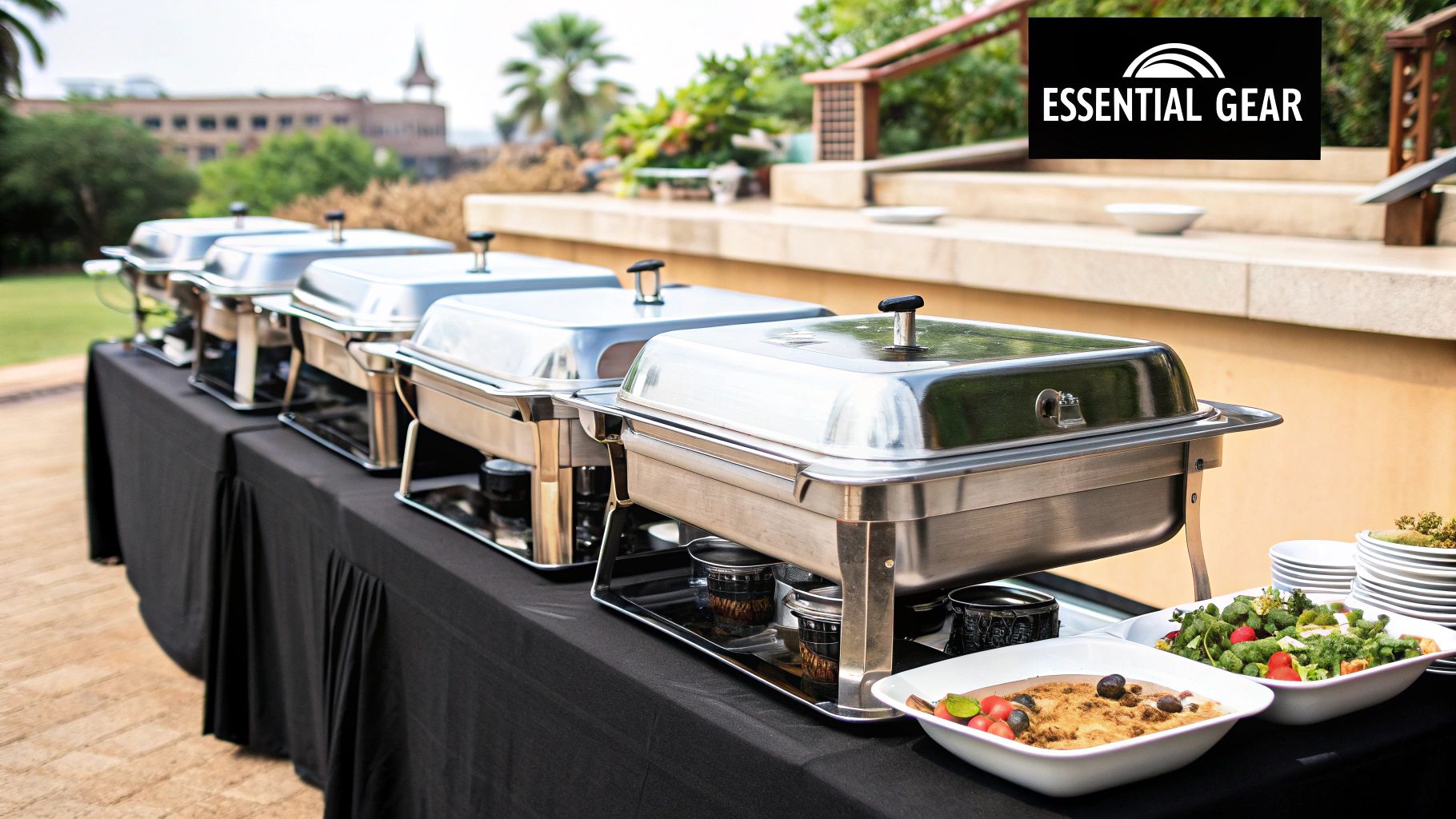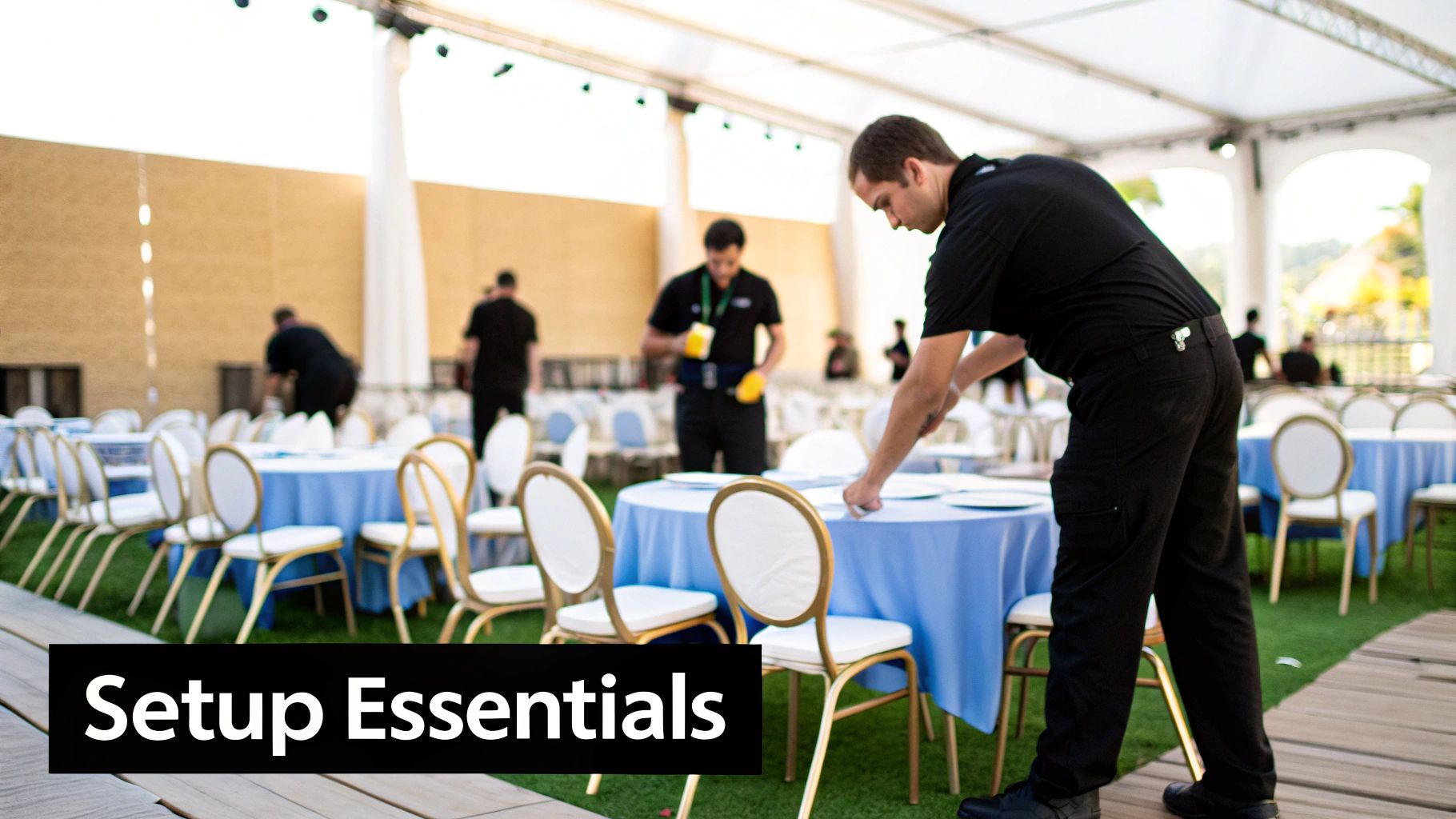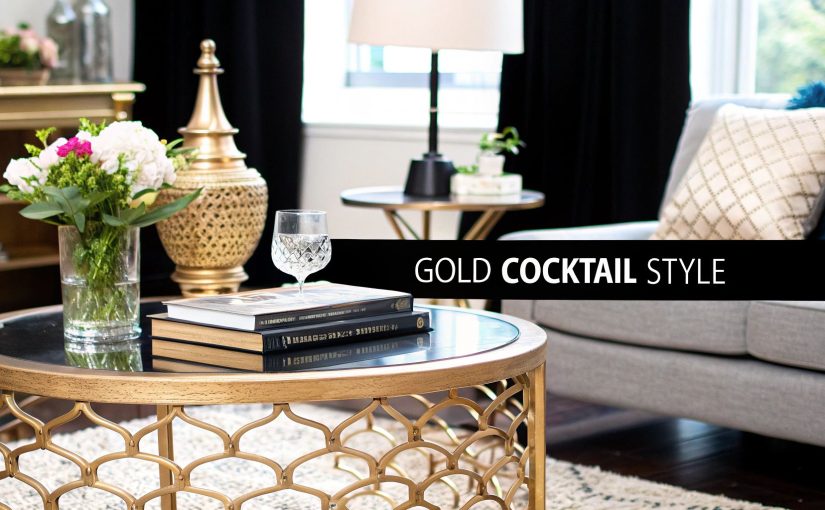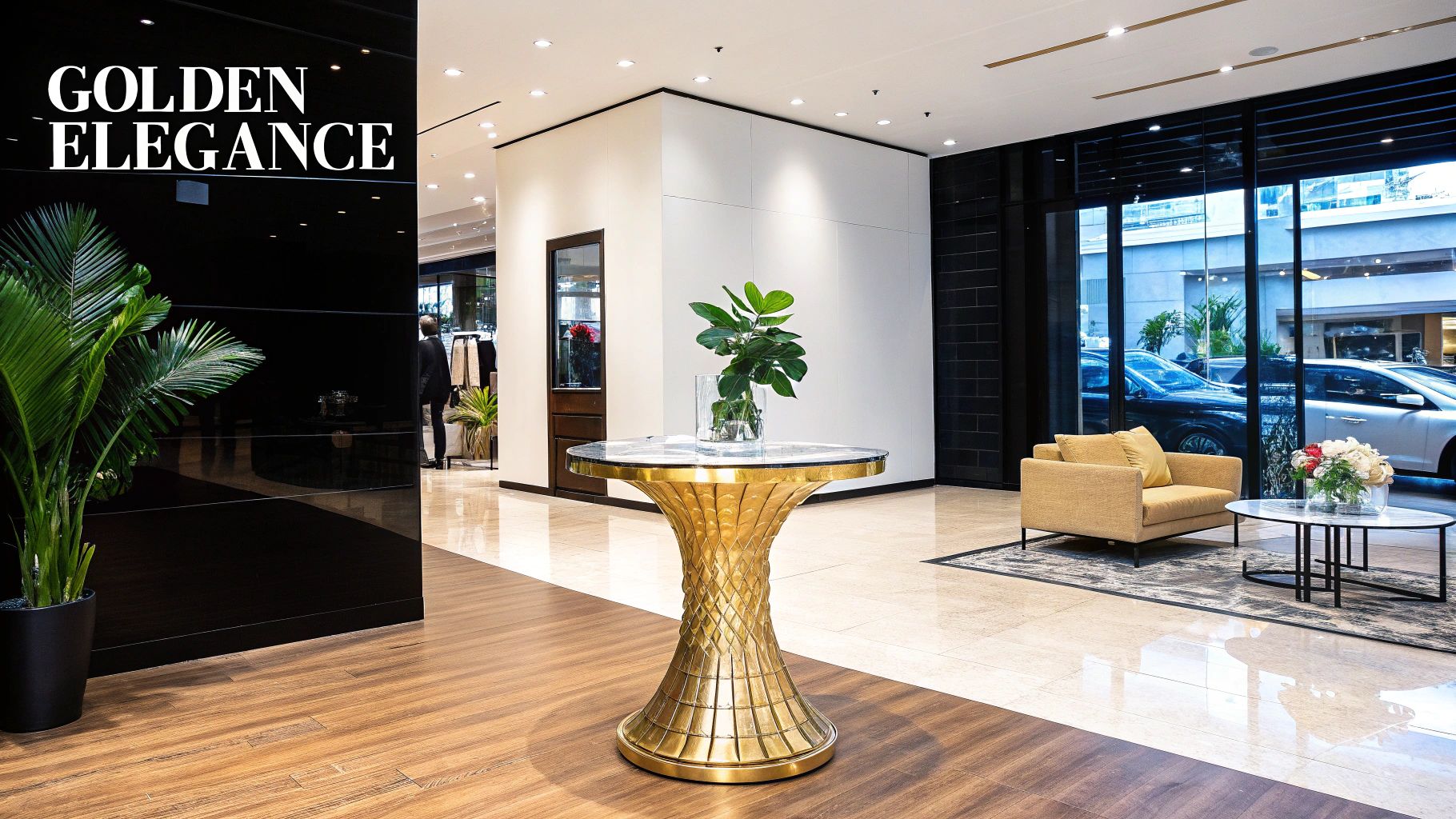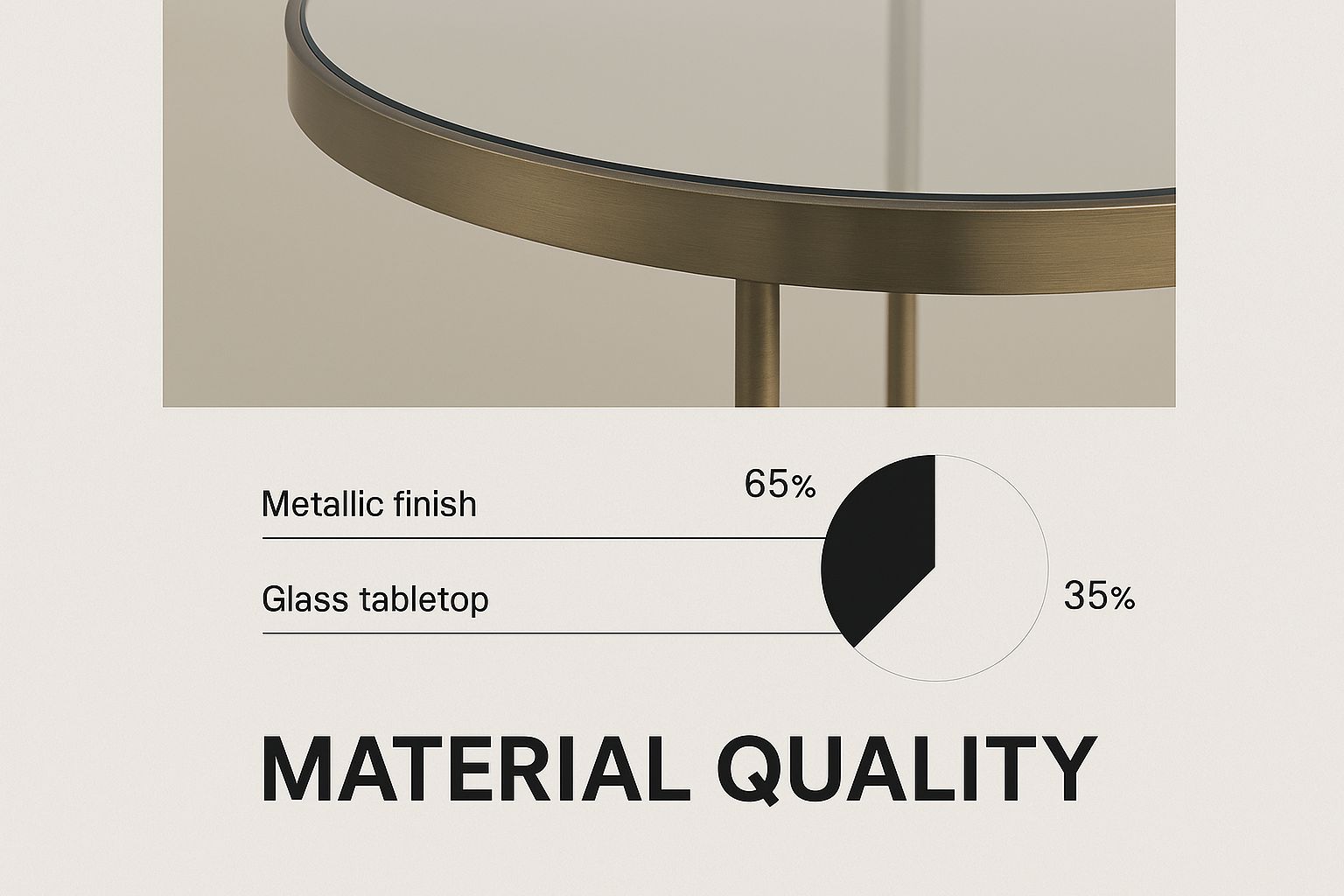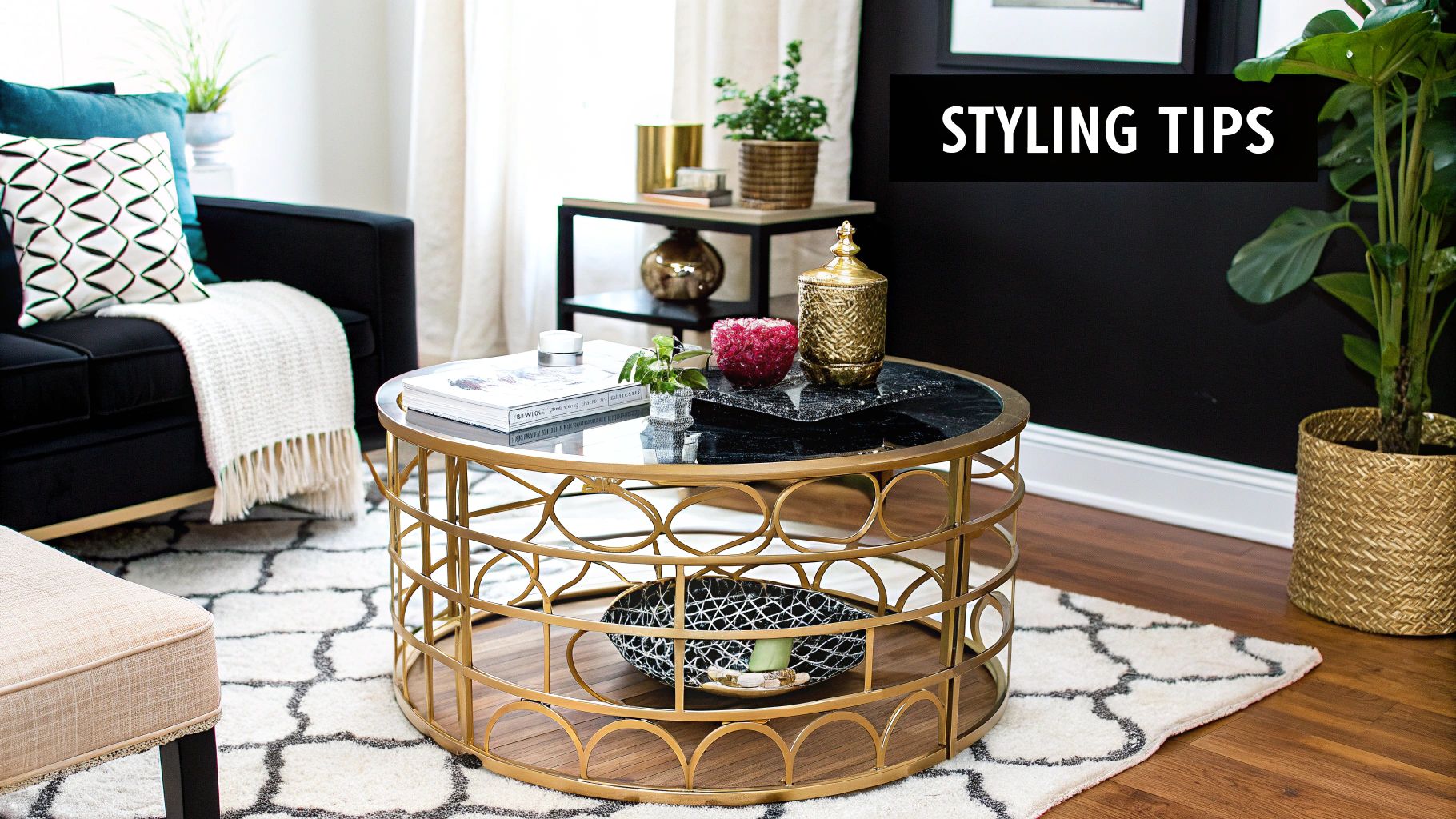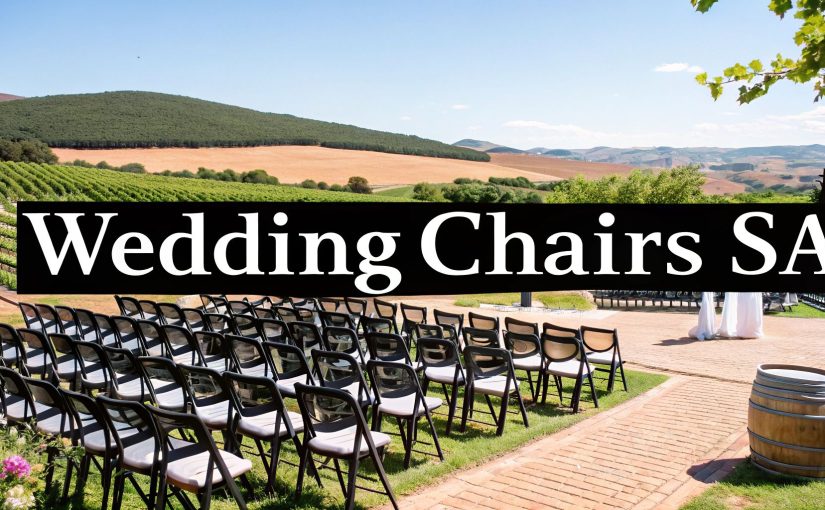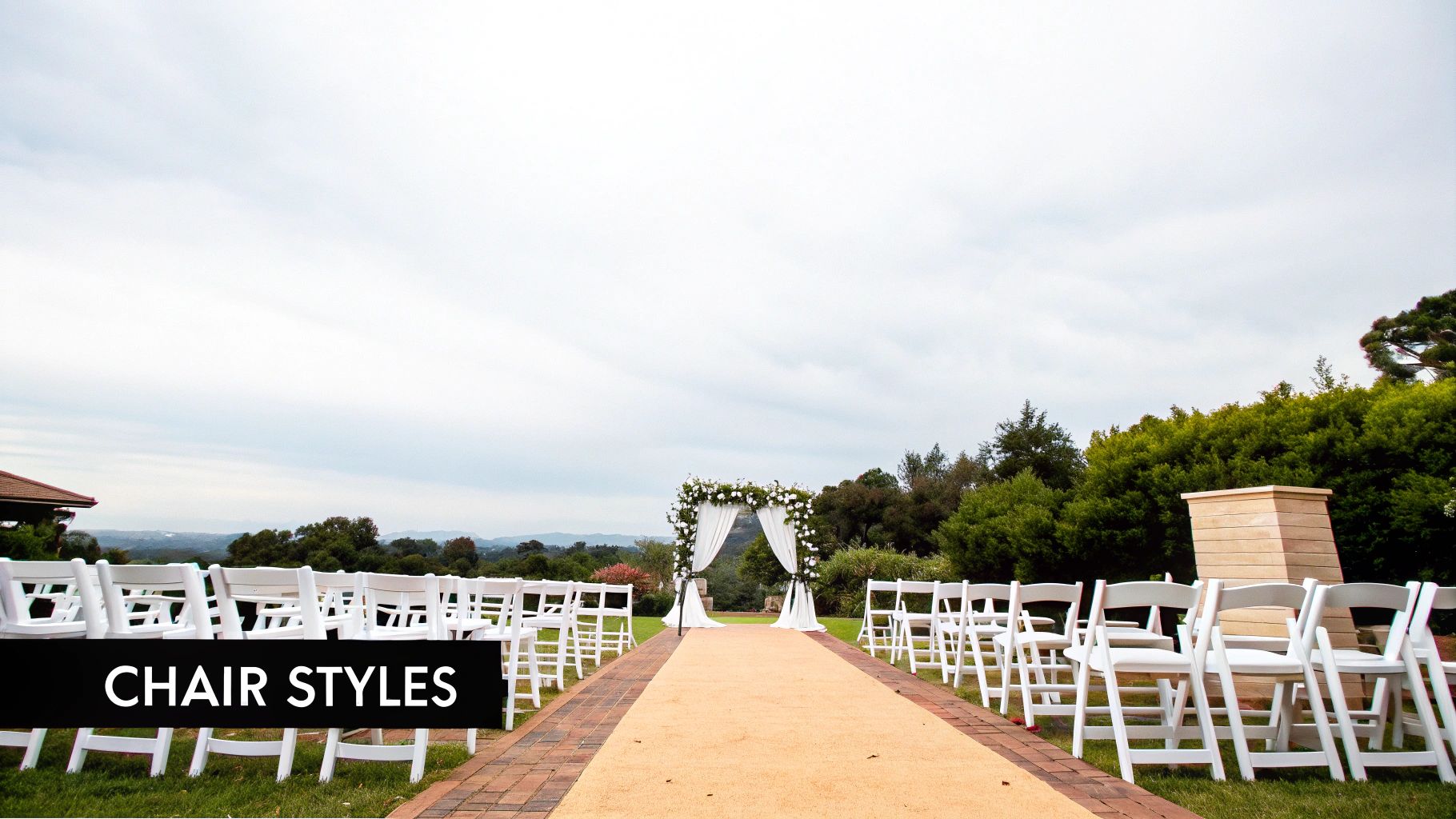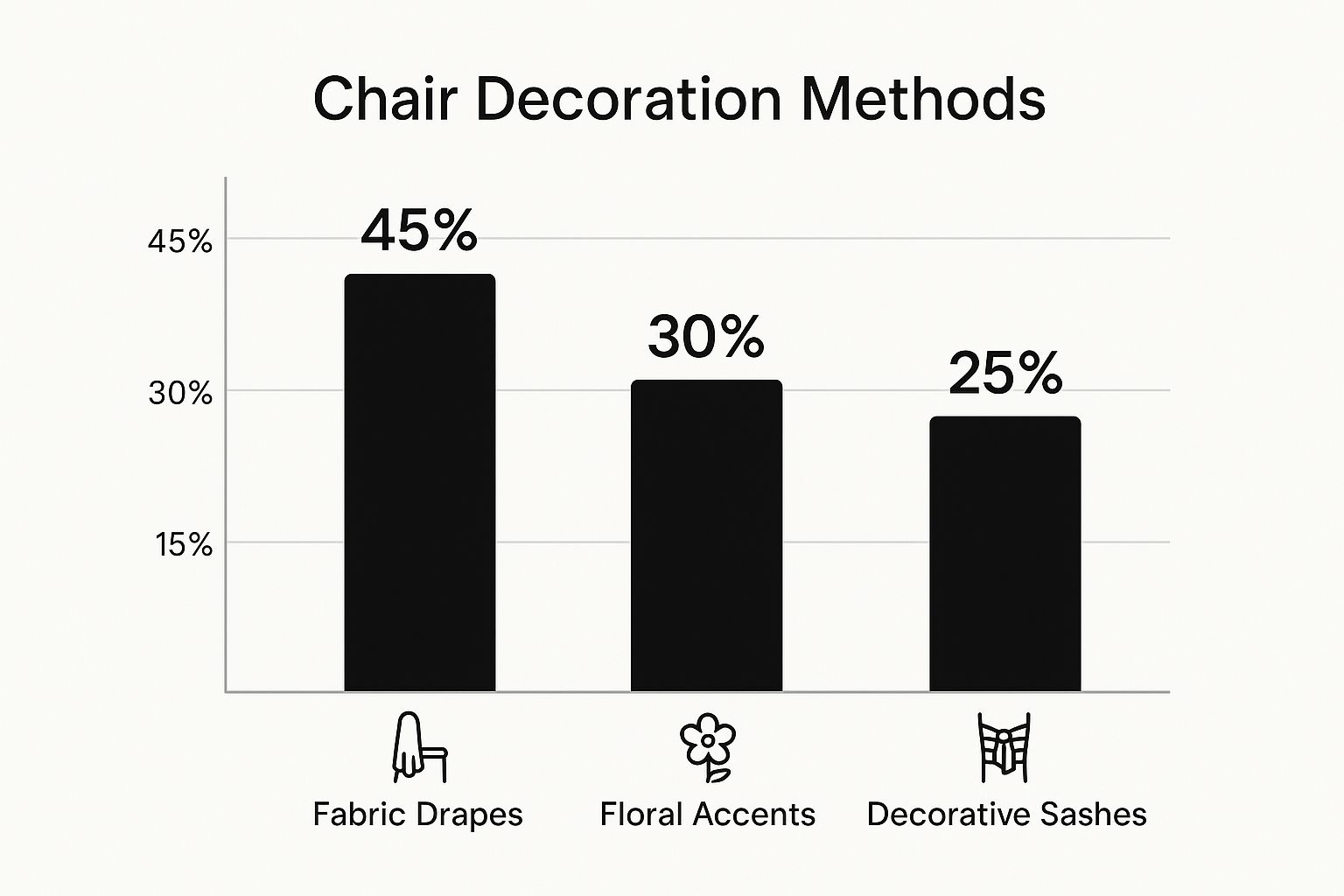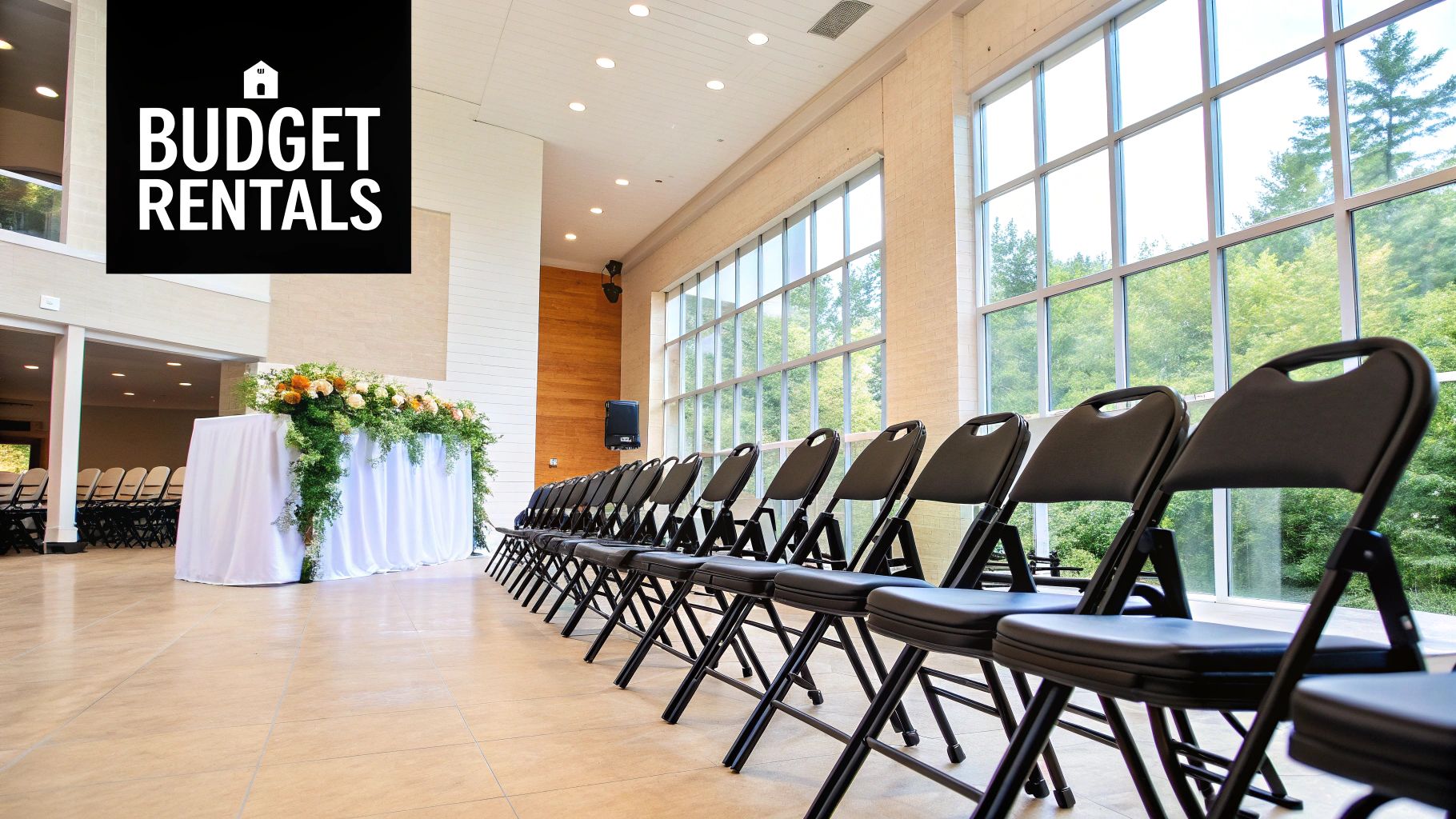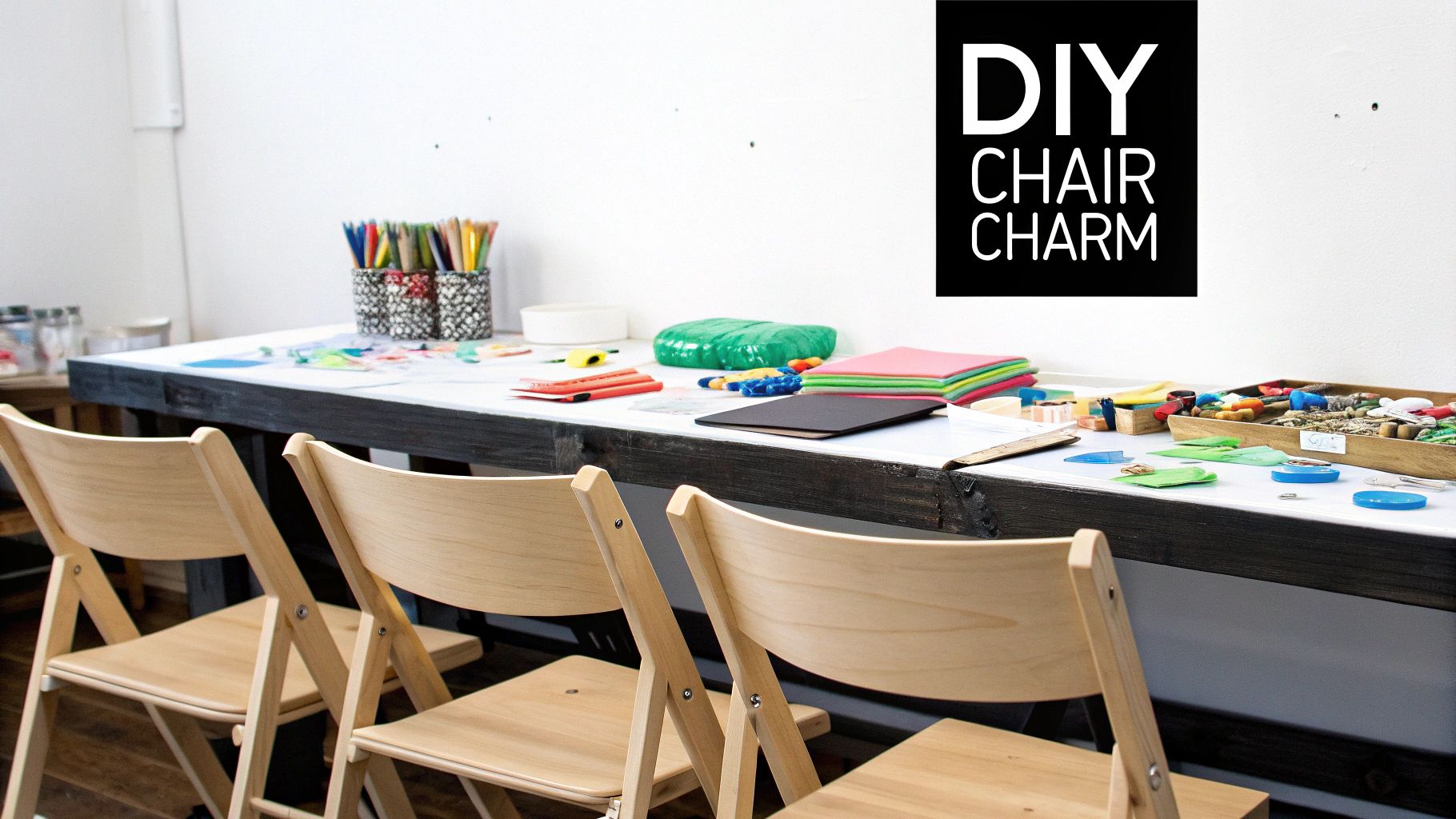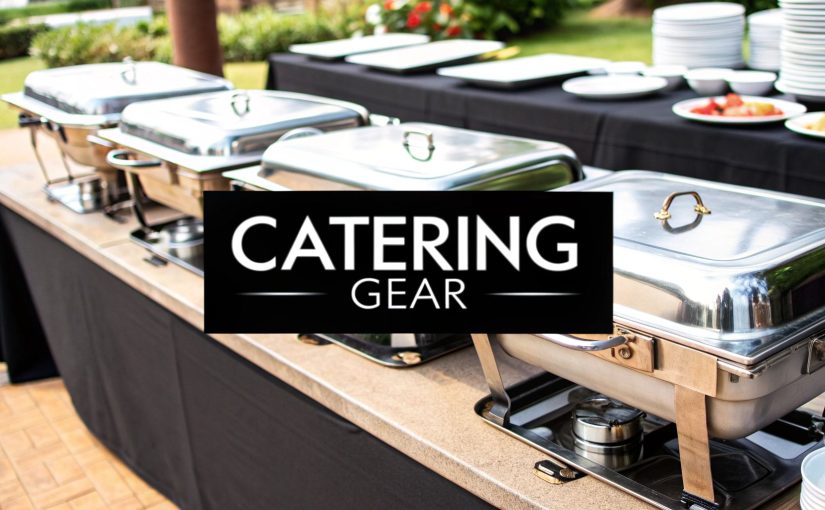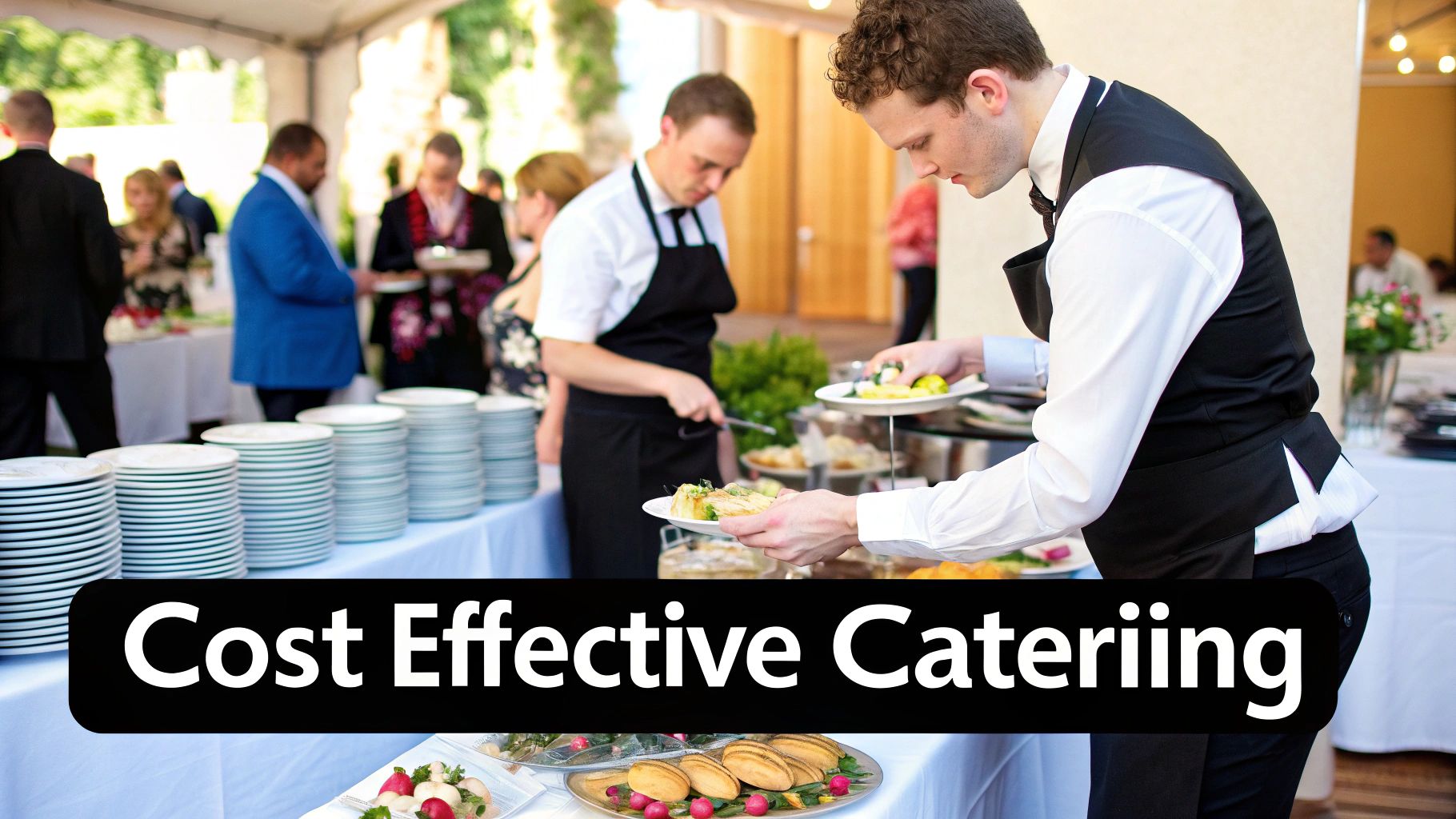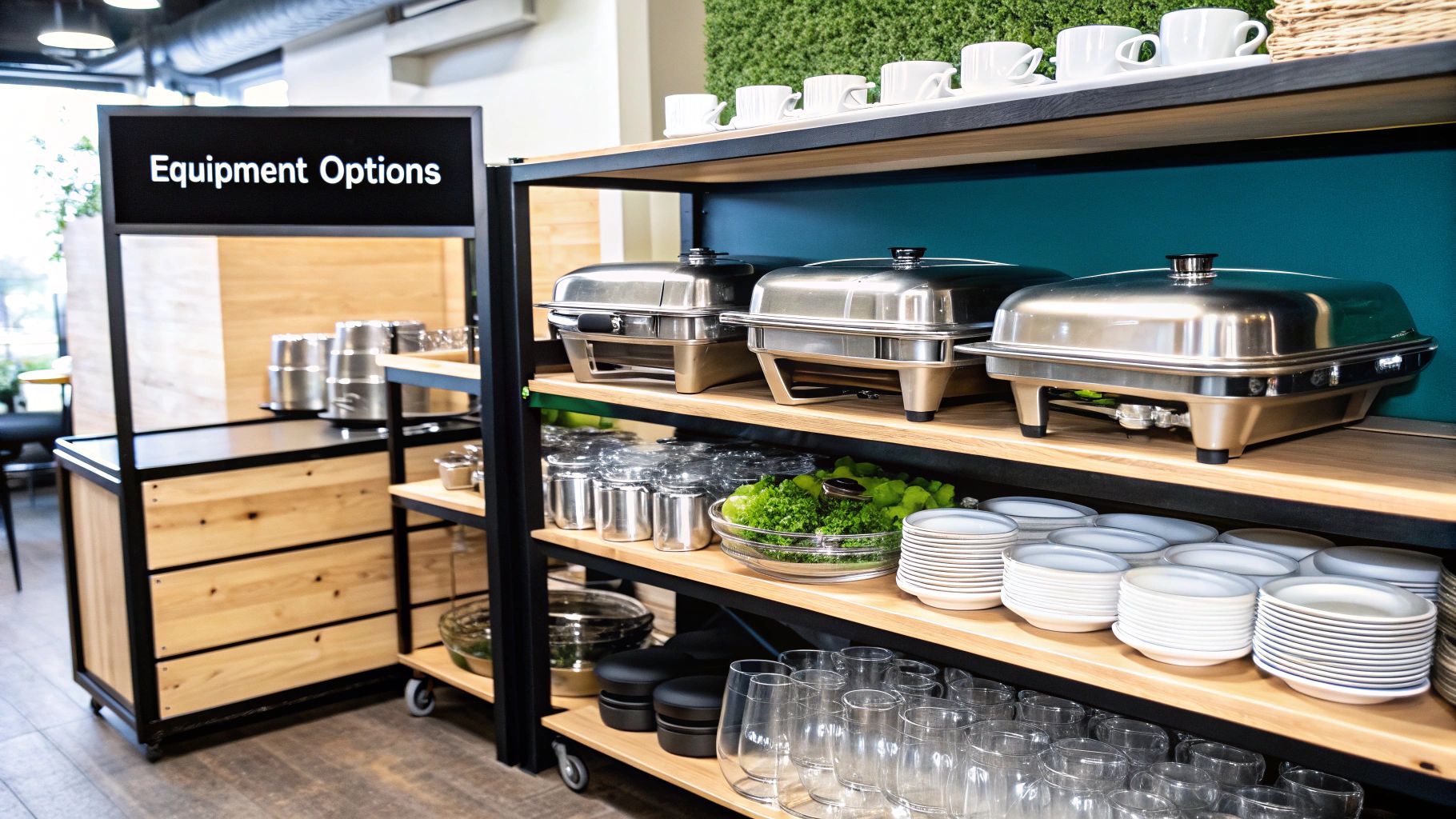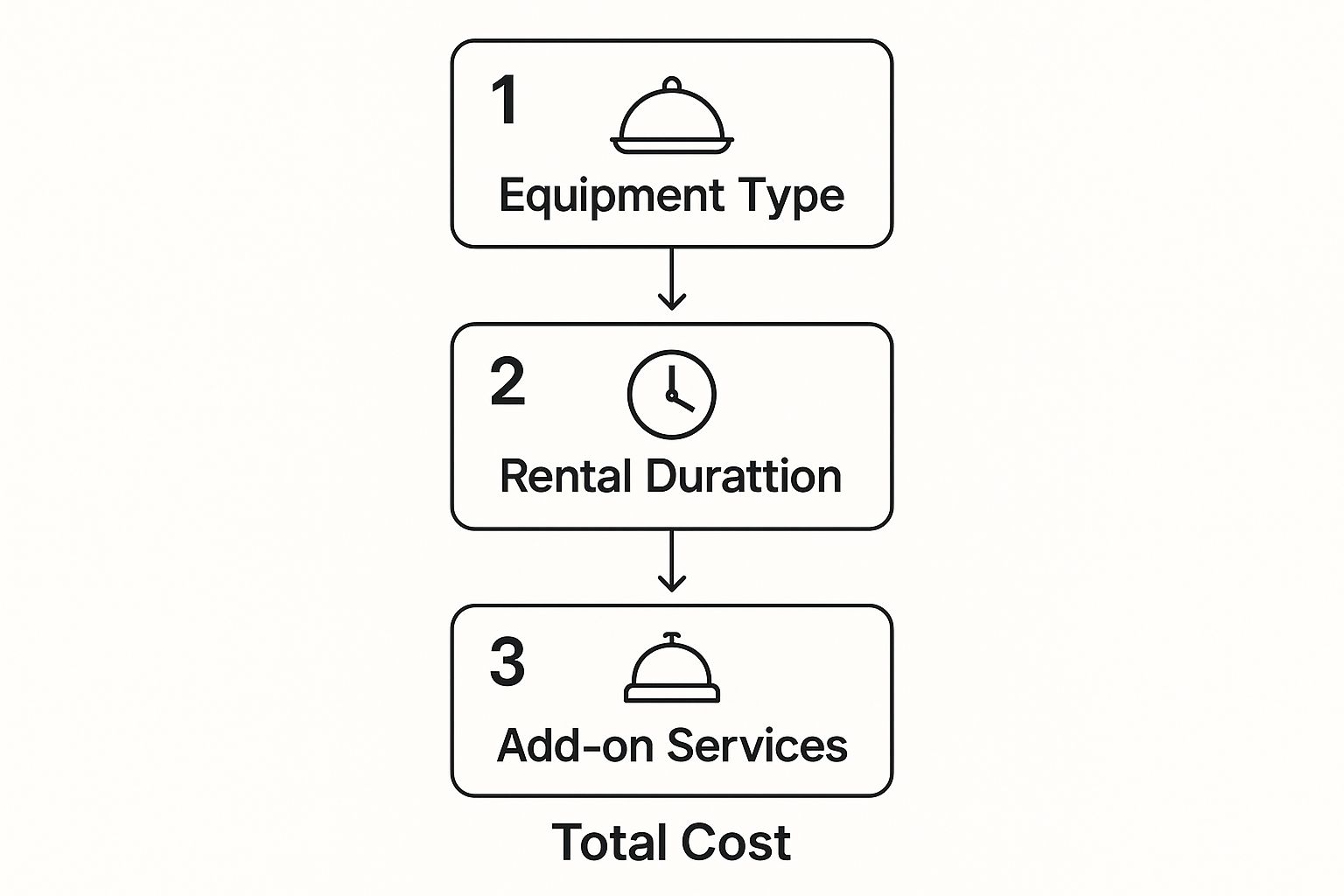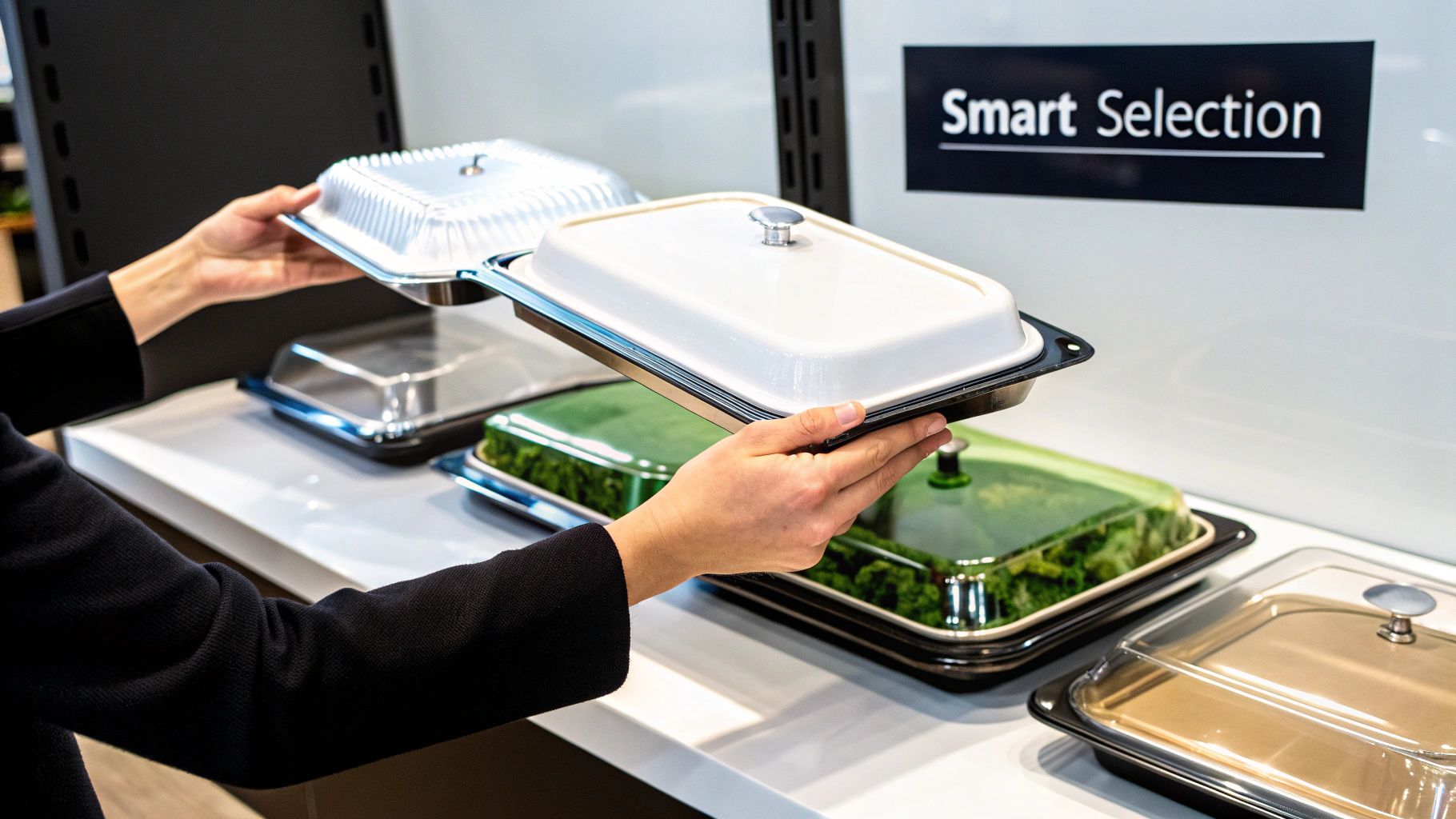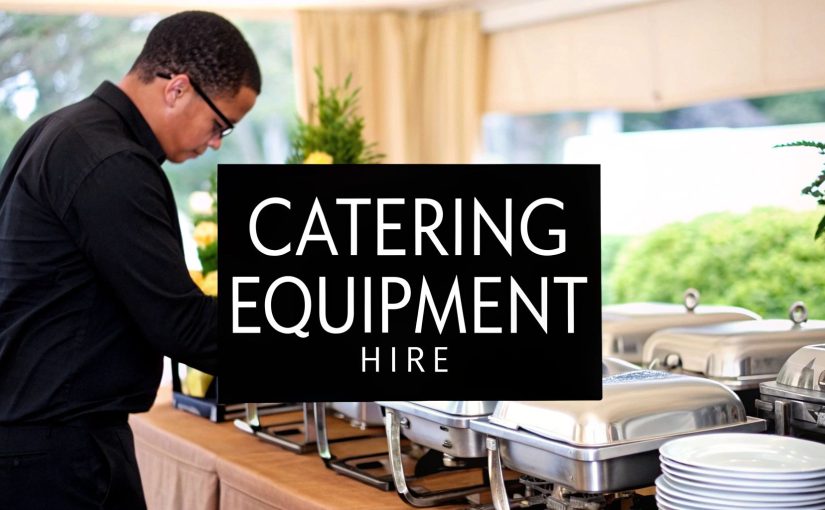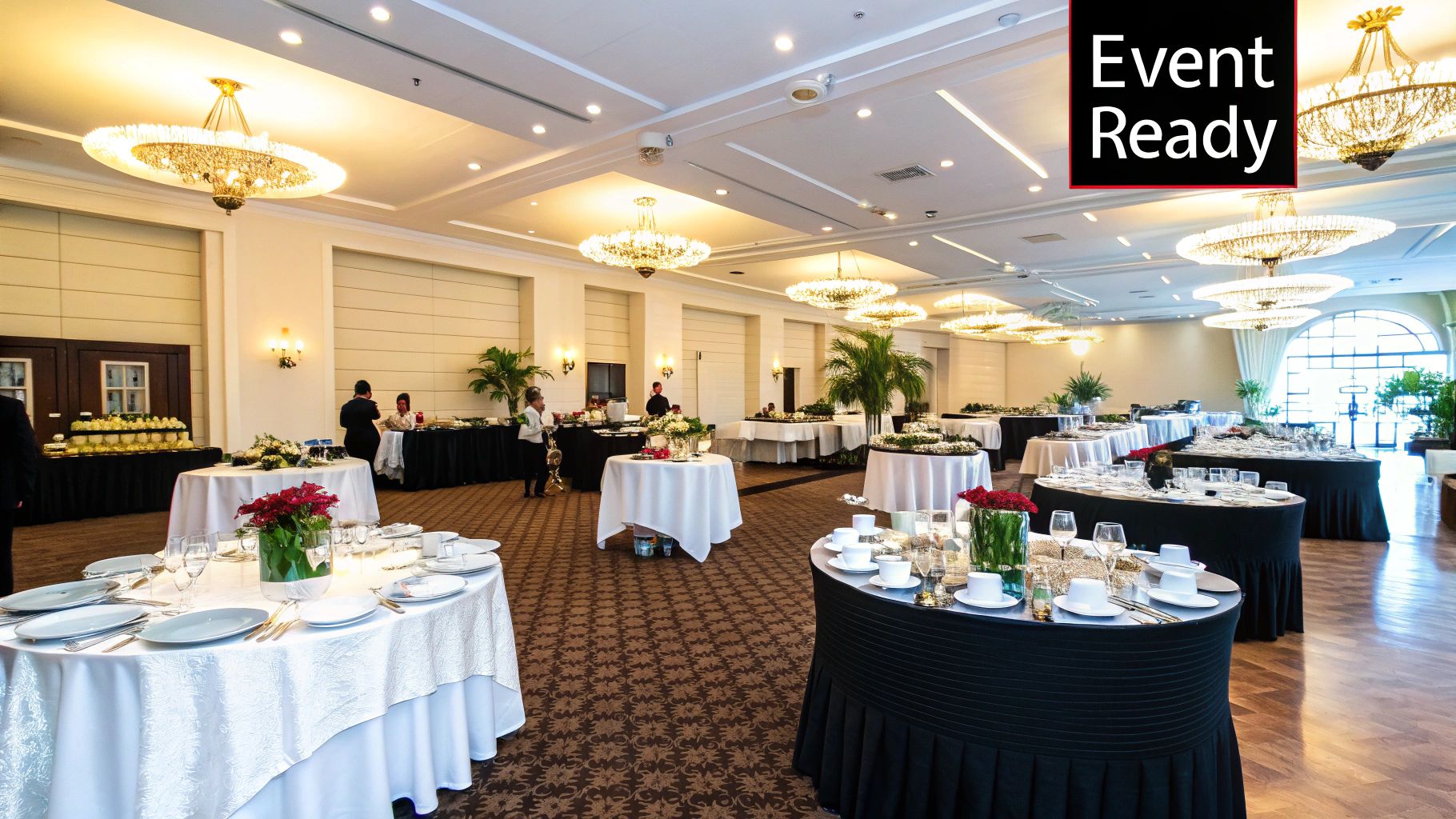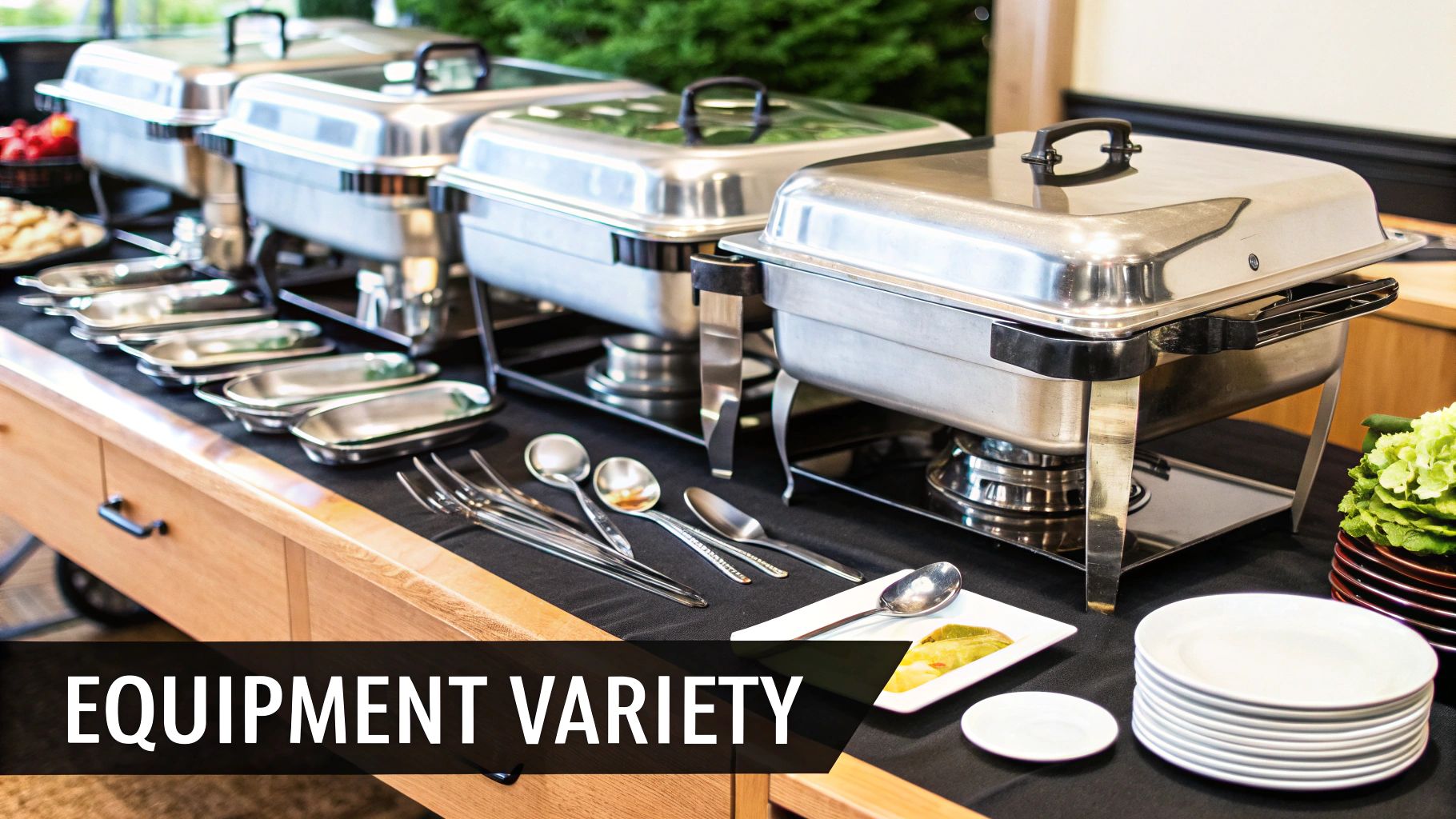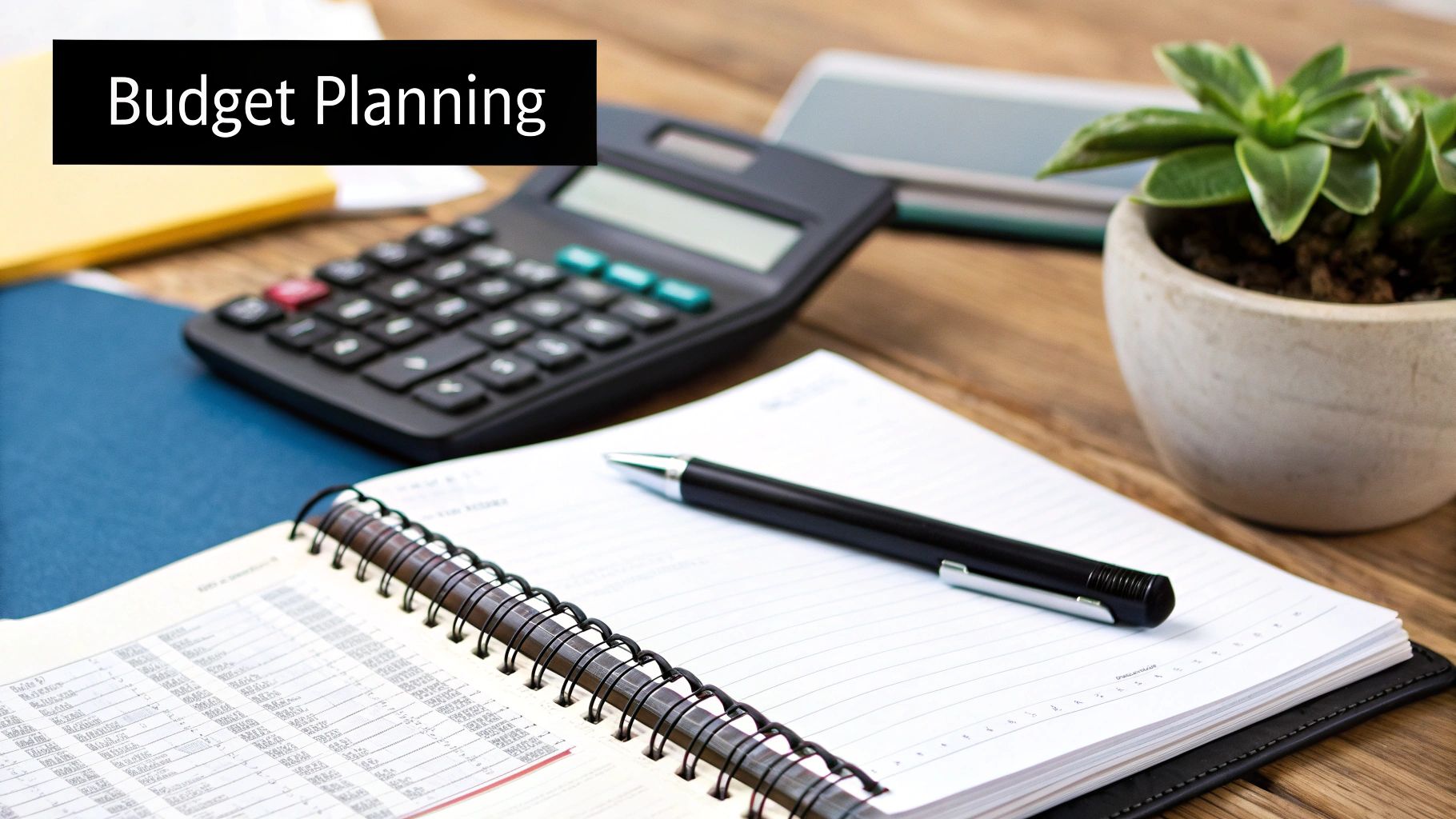Tapping "party decor hire near me" into your search bar? Good call. Hiring decor is almost always a smarter move than buying, especially for a once-off event. It’s more cost-effective, stylish, and sustainable, giving you access to professional, on-trend items without the buyer's remorse.
Why Hiring Decor Is a Smarter Choice for Your Event
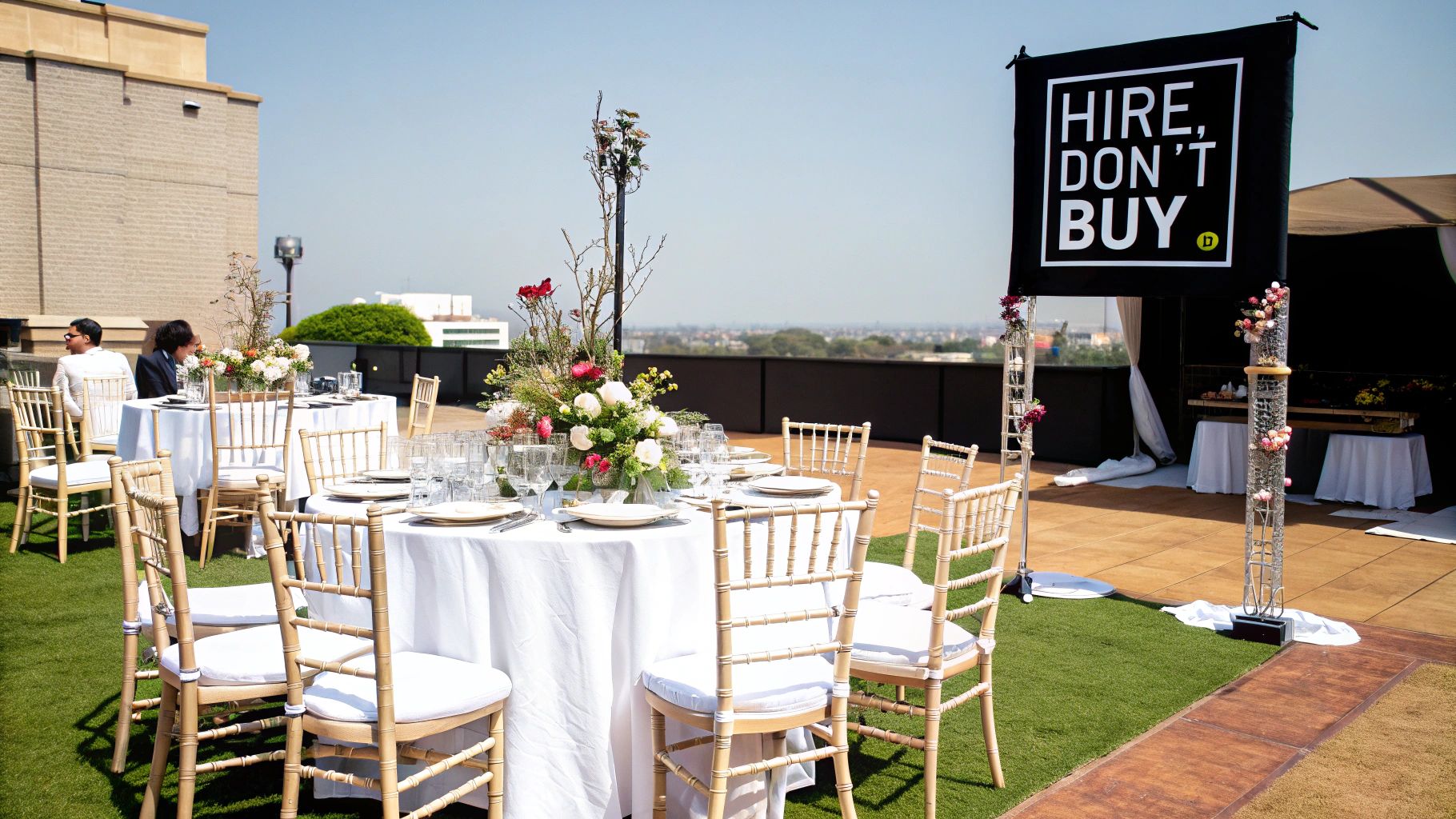
Planning an event, whether it’s a milestone birthday in Durban or a chic corporate launch in Johannesburg, is a juggling act. Choosing to hire your decor instead of buying it solves several problems at once, making it one of the best decisions you can make.
The most obvious win is for your wallet. Buying high-quality tablecloths, centrepieces, and speciality lighting for dozens of guests is a massive expense. And what happens after the party? You're stuck with a pile of decor you might never use again, taking up valuable storage space. Hiring simply cuts out the high upfront cost and the post-event storage headache.
Access Professional-Grade Inventory
Beyond the savings, hiring opens up a whole world of professional-grade, trend-forward inventory that you wouldn't otherwise have access to.
Want that stunning photo backdrop you saw on Pinterest? An elegant fairy light curtain to create a magical atmosphere is just a booking away. A rental company’s catalogue is carefully curated by experts who know what works and what will make your event look incredible. It’s the secret to achieving that polished, high-end finish without the hefty price tag.
Key Takeaway: Hiring gives you the creative freedom to perfectly match your decor to any theme—from a boho wedding in the Winelands to a vibrant neon party—without the financial burden of ownership.
Embrace Sustainability and Convenience
These days, modern event planning is all about sustainability. The event services market in South Africa is growing, and a big part of that is because clients are looking for more eco-conscious choices.
It makes sense. Research shows that 73% of millennials prefer renting over buying, and 65% of clients favour rental companies that show environmental responsibility. Hiring is simply more sustainable, reducing waste by allowing beautiful items to be used again and again. This approach not only shrinks your event's environmental footprint but also makes your life easier. The hire company handles the delivery, setup, and collection, leaving you free to actually enjoy the party.
Finding the Best Local Decor Suppliers
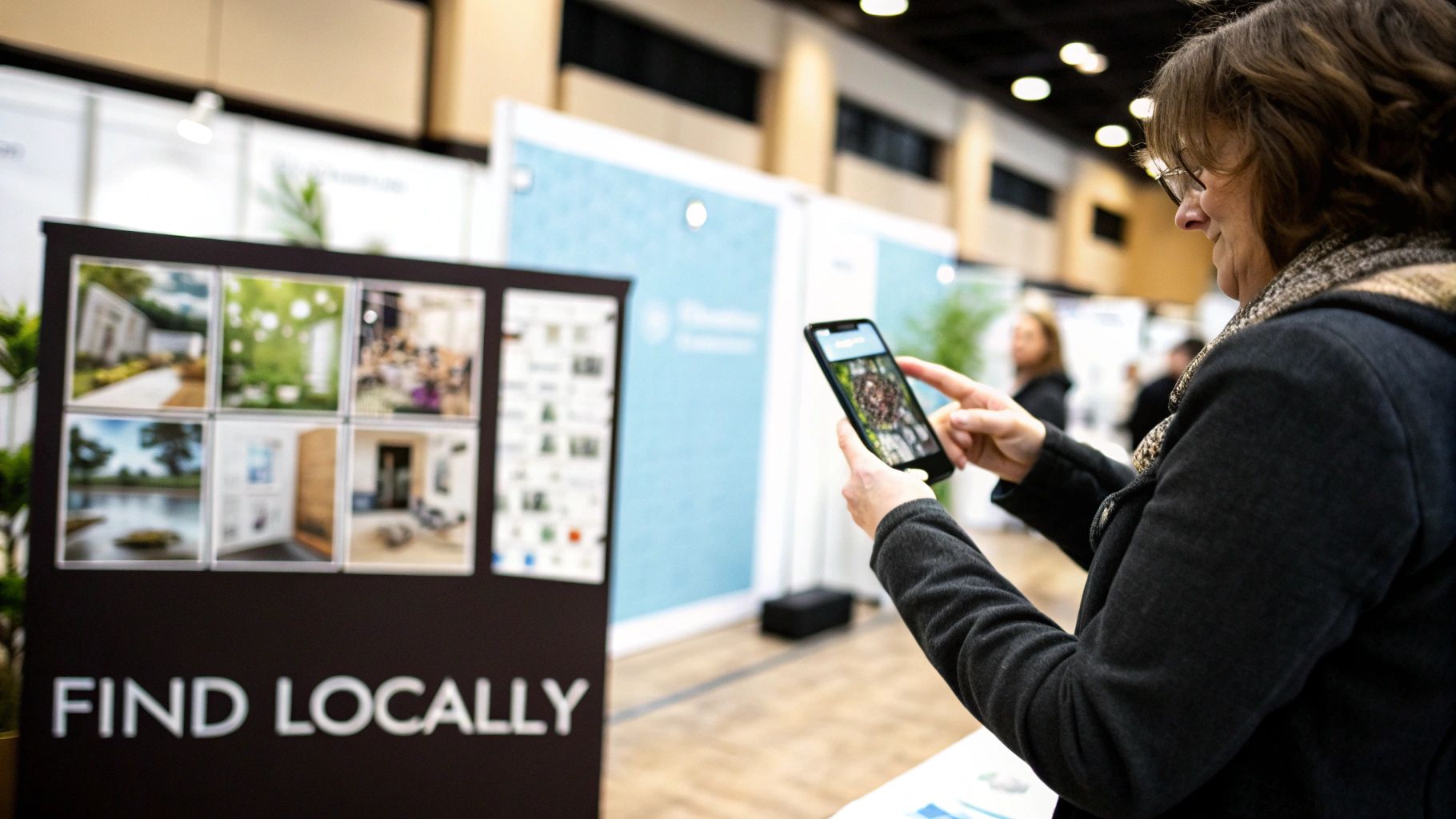
So, you’re ready to find that perfect decor partner to bring your event vision to life. A quick "party decor hire near me" search is a decent place to start, but the real magic happens when you dig a bit deeper. Your mission is to go beyond the first page of Google and build a solid list of suppliers whose style genuinely clicks with yours.
Social media is your best friend here. Think of Instagram and Pinterest as visual search engines, not just places for inspiration. They’re basically live portfolios for local creative businesses.
Get specific with your hashtags. Instead of something generic, try a more targeted search like #CapeTownWeddingDecor or #KidsPartyPropsDurban. This little trick helps you cut through the noise and zone in on suppliers who are already creating the exact look you’re after.
Using Visuals to Track Down Vendors
As you’re scrolling, keep your eyes peeled for photos that just feel right for your event. When you spot one that captures the atmosphere you're aiming for, tap on it and check who’s been tagged.
You’ll often find that event planners, venues, and photographers tag the decor hire company they worked with. It’s a brilliant shortcut to finding a supplier who’s already been vetted and trusted by other professionals in the industry.
Another great move is to use location tags. For instance, search the geotag for a popular wedding venue in Stellenbosch. This will pull up a feed of real events that have happened there, and you'll almost certainly see the decor companies that work that venue all the time.
Pro Tip: Don't get swept away by one or two amazing photos. Take a moment to scroll through a supplier's entire feed. You're looking for consistency in quality and style. This gives you a much better feel for their real inventory and recent work, helping you sidestep businesses with tired, outdated stock.
Beyond the social media rabbit hole, don’t forget to check out specialised local directories. Websites dedicated to the South African wedding and events scene often have curated lists of suppliers, complete with portfolios and reviews. They’ve already done a lot of the initial legwork for you, making it that much easier to find reputable pros.
By mixing and matching these search tactics, you’ll quickly have a strong list of potential partners to start reaching out to.
How to Vet and Compare Decor Hire Companies
Alright, you've got a shortlist of potential decor suppliers. Brilliant! Now comes the really important bit: separating the pros from the pretenders. This is where a little bit of detective work now saves you from a world of stress on the day of your event. Trust me, getting this right is the key to a smooth-running, beautiful party.
Your first stop should be their online footprint, but don't just glance at the star rating. Dig into the actual reviews on Google, their Facebook page, and any local directories. What you're looking for are patterns. A single grumpy review can be ignored, but if you see multiple people complaining about late deliveries, chipped vases, or dirty linen, that’s a massive red flag. On the flip side, consistent praise for their great communication and top-notch gear is a very good sign.
Scrutinising Their Portfolio and Social Proof
Think of a company’s photo gallery as its CV. A picture really is worth a thousand words here. How recent are the photos? If their last post was from a wedding in 2019, you have to wonder if they're still at the top of their game. You want to see fresh, high-quality images from recent events—it shows they’re busy, in-demand, and trusted by current clients.
Be a bit wary of a portfolio that only has picture-perfect, styled photos. While they look stunning, they don't always show what the items look like after a few hires. The best galleries have a healthy mix of professional shots and real-event photos, maybe tagged by happy clients or other vendors. This gives you a much more honest feel for their work and the actual condition of their inventory.
This infographic breaks down the simple three-phase process I use to check out any new local decor hire company.
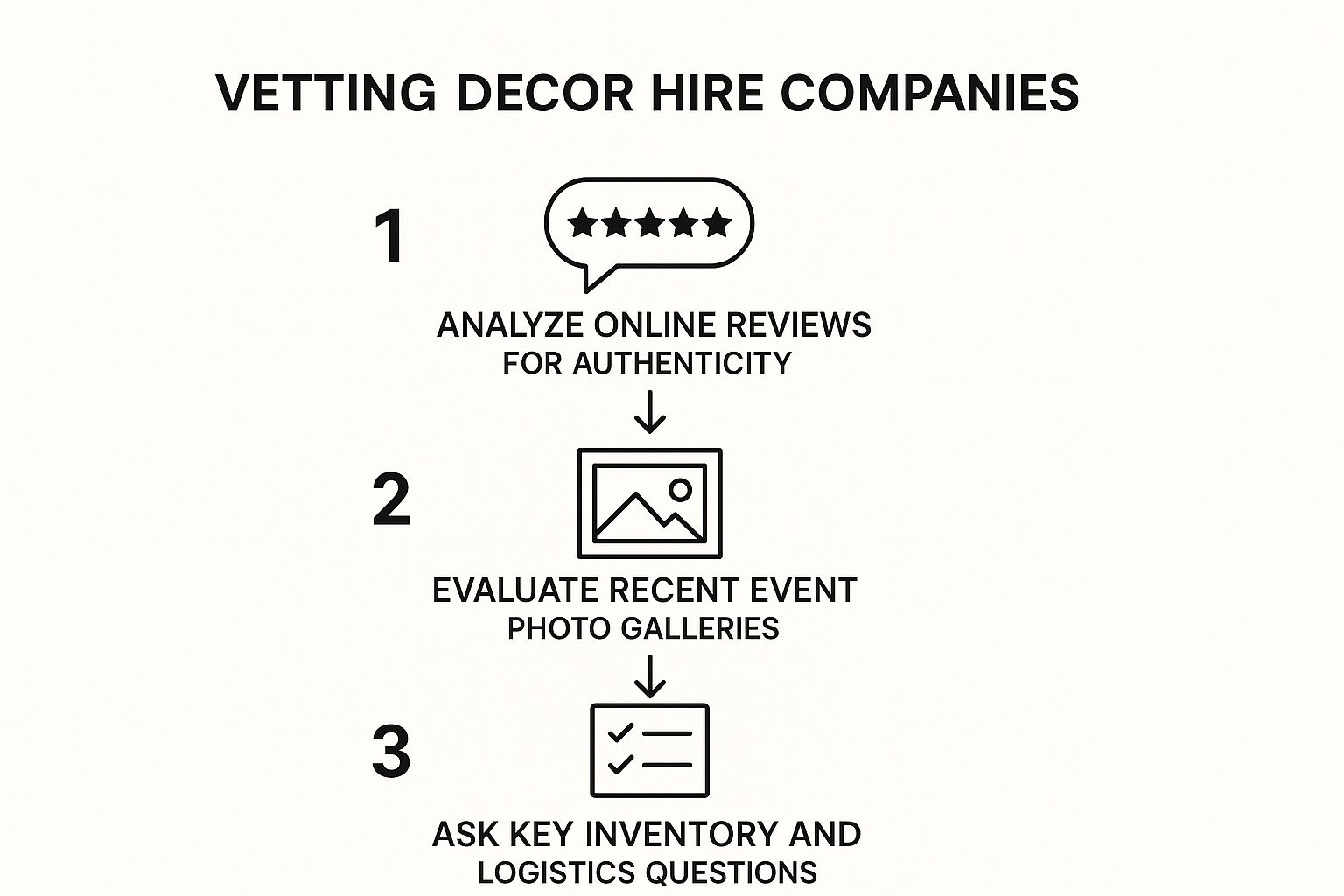
It’s a simple flow: start with their reputation online, move on to visual proof of their work, and only then do you pick up the phone.
Asking the Right Questions
Finally, it's time to make contact. How a company handles your first enquiry speaks volumes. Are they quick to respond? Are their answers clear and helpful? Slow, vague, or one-word replies are a bad omen for the kind of service you'll get when things get busy. You need a partner who is on the ball.
When you do connect, don't go in blind. Have a list of questions ready to go. This isn't the time to be shy—you need to nail down the details that could make or break your event.
To make it easier, I've put together a quick checklist. Use these questions to guide your conversations and compare potential suppliers fairly.
Supplier Vetting Checklist
| Question Category | Key Questions to Ask | What to Look For in the Answer |
|---|---|---|
| Inventory & Quality | Can I pop in to see the items in your showroom or warehouse? How often do you repair or replace your stock? | A confident "yes" to a visit. They should have a clear process for maintaining their inventory and be proud to show it off. |
| Logistics & Fees | What are your standard delivery/collection times? Are there extra fees for setup, takedown, or after-hours service? | Transparency is key. Look for clear, upfront pricing with no hidden costs. Vague answers about fees are a red flag. |
| Policies & Protection | What’s your policy for damaged or lost items? Do you offer a damage waiver, or is there a security deposit? | A professional company will have a straightforward, fair policy. They should be able to explain it clearly. |
Getting solid, confident answers to these questions will help you find the best party decor hire near me and lock in your choice with complete peace of mind.
Right, let's talk about the money side of things. Getting quotes from different suppliers can sometimes feel like you're comparing apples to oranges, but figuring out the costs is key to keeping your event budget from spiralling. Once you understand how companies price their services, you're in a much better position to make a smart choice.
Most local party decor companies will structure their pricing in one of two ways.
First, you've got the à la carte option, where you pick and choose individual items. This is brilliant if you only need a few key pieces – say, a specific photo booth backdrop or some unique lighting to create a mood. Then there's the package deal. This is where suppliers bundle popular items together, often at a better price. Think of a "wedding ceremony package" that might include an arch, guest chairs, and aisle runners all in one.

Uncovering Those Sneaky Hidden Costs
The initial quote might look great, but you always, always need to ask about the extras. These are the little details that can blow your budget if you're not ready for them. The best approach is to be proactive and get all the costs out in the open from the very beginning.
To save yourself a nasty surprise, make sure you confirm these points:
- Delivery and Collection Fees: Are these built into the price, or is there a separate charge based on how far they have to travel?
- Setup and Takedown Labour: Does the quote include the manpower to physically set everything up and pack it all away afterwards?
- After-Hours Service: If your party is going to finish late, find out if you'll be hit with a premium for collection outside of their normal business hours.
- Damage Waiver or Deposit: You need to be clear on their policy for accidental damage. Is it a non-refundable waiver fee or a refundable security deposit you'll get back?
Let me give you a real-world example: Say you've been quoted R5,000 for tables and chairs for a 100-guest wedding. If you don't ask about the extras, you could easily get hit with an extra R1,500 for delivery and another R1,000 for an after-hours collection. Just like that, your cost has jumped by 50%.
What Really Goes Into The Price Tag?
Rental prices aren't just numbers plucked from thin air. They reflect the huge investment these companies make in their inventory. For a small rental business here in ZA, the initial cost to stock up can be anywhere from R30,000 to R150,000. On top of that, pricing has to factor in local competition and high-demand times like wedding season. If you're curious, you can learn more about the economics of renting furniture for events.
A company's day-to-day running costs and profit margins—which can be as high as R12,000 per event for big-ticket items like tents—are all baked into the prices you see. You can even check out some stats on the most profitable rental items on booqable.com.
When you understand these behind-the-scenes factors, you get a much better feel for the value you’re getting. It helps you move forward and confidently pick the right decor hire partner for your budget.
Securing Your Booking and Finalising the Contract
Right, you’ve done the hard work, vetted the suppliers, and found the perfect partner to bring your event vision to life. Now for the crucial part: making it official and locking in your booking.
This is the moment where verbal agreements and hopeful emails turn into a solid plan. A detailed, written contract is your best friend here—it protects you and the hire company, ensuring there are no last-minute surprises or misunderstandings on the day. Think of it as the roadmap for your event's look and feel.
A professional contract is also a massive green flag. It shows you’re dealing with a reputable business that values clarity and has its act together.
Before you even think about signing, pour yourself a cup of coffee and read through the entire agreement. It’s about more than just checking off the chairs and tablecloths; you need to understand the terms and conditions that will govern your hire.
Key Clauses to Double-Check
The fine print is where the important details live, so pay close attention. You're looking specifically for anything related to logistics and potential problems.
- Logistics Timeline: The contract absolutely must have clear delivery and collection windows. Vague promises like "morning delivery" just won't cut it. You need specific times to coordinate with your venue and other suppliers.
- Damage and Loss Policy: What happens if a wine glass takes a tumble or a napkin gets a stubborn stain? The contract should spell this out. It’ll define whether a security deposit is used or if you’ll be invoiced separately for a replacement.
- Cancellation Terms: Life can be unpredictable. Make sure you understand the cancellation policy inside and out. Find out the cut-off date for getting a full or partial refund if your plans suddenly change.
A thorough contract isn't just a formality; it’s a roadmap for a successful event. It ensures everyone is on the same page, from the number of fairy lights to the exact pickup time, eliminating guesswork and reducing stress.
Putting everything down in writing is non-negotiable. To help you manage all these details, you might find our event planning checklist template incredibly useful for keeping track of supplier contracts and other important deadlines.
Once you’re happy with every clause and have confirmed that every single item is listed correctly, you can sign on the dotted line and pay that deposit. It’s a great feeling to know your decor is secured, bringing you one big step closer to a flawless event.
Your Top Party Decor Hire Questions, Answered
Diving into the world of "party decor hire near me" can feel a little daunting at first, especially if you're new to it. You’ve probably got a few questions swirling around. Let's clear the air and walk through the most common queries so you can move forward with total confidence.
How Far in Advance Should I Book?
This is easily the biggest question we get, and the answer really depends on your event.
For those big, milestone events like a wedding or a major corporate bash, you’ll want to lock in your decor six to nine months in advance. I can't stress this enough. The most sought-after items and key dates—especially during peak season in places like the Cape Winelands—get snapped up incredibly fast.
Planning something a bit smaller, like a birthday party or a baby shower? You have a bit more breathing room. Booking one to two months ahead is usually a safe bet.
Can I See the Items Before I Hire Them?
Absolutely! In fact, if a company doesn't let you, that's a red flag. Any reputable supplier will have a showroom or warehouse you can visit (usually by appointment) to see everything for yourself.
This is your chance to check the quality, see the real-life colours, and physically touch the items. It’s the best way to make sure everything will match the aesthetic you're dreaming of.
What Happens If Something Breaks?
It’s a party, and accidents can happen. This is a critical detail to get straight before you sign anything. Most hire companies will have a damage waiver or ask for a refundable security deposit to cover any mishaps.
Make sure you read the contract carefully. It should spell out their policy on damages. While a little bit of wear and tear is generally expected, you'll likely be billed for any significant damage or if an item goes missing. Don't be shy about asking for clarification!
Let's be honest, in South Africa, we love a beautiful event. The atmosphere is everything. It's no surprise that nearly 60% of local brides said decor and venue styling were among their top three wedding priorities. It just goes to show how much we value the guest experience. You can see more on these South African wedding planning trends.
This focus on creating a stunning visual experience is what makes our local decor hire industry so vibrant. Understanding these common policies will help you find the perfect partner to bring your vision to life without any unexpected surprises down the line.
Planning an unforgettable event in Cape Town? Let ABC Hire provide the stunning, high-quality furniture and decor to bring your vision to life. Explore our extensive rental inventory today!



